#but she pursues the antagonist instead of the male love interests
Explore tagged Tumblr posts
Text
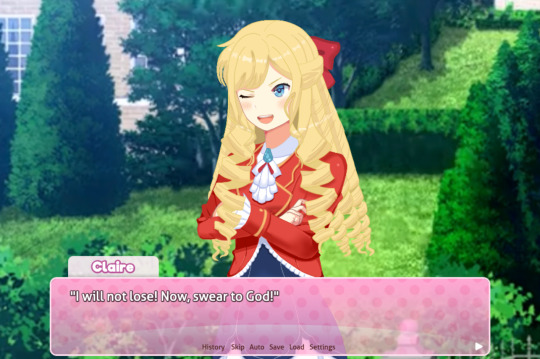
I'm in love with the villainess ddlc-ified. I was thinking about dating sim girls who don't have romance routes
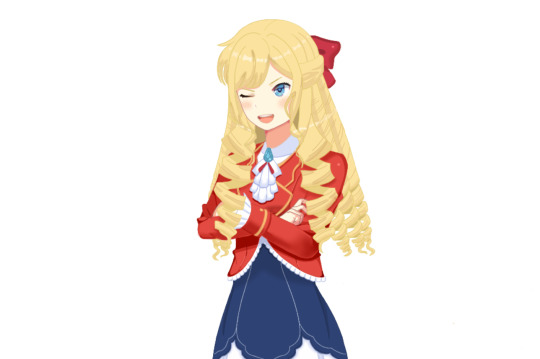
#for the uninitiated iilwtv isn't a dating sim it's a yuri isekai where the mc gets transported into an otome game#but she pursues the antagonist instead of the male love interests#iilwtv#I'm in love with the villainess#im in love with the villainess#I favor the villainess#claire francois#jo's art#ddlc#doki doki literaturę club
73 notes
·
View notes
Text
Mary Bonnet is such a good subversion of the widow character, but I also think she’s an amazing subversion of women in fanfiction.
Our Flag Means Death is aware of it’s more fanfiction-esque tone (ex. the comment about Stede’s diary) and it would have been easy to make Mary an object to overcome in Stede and Ed’s happy ending.
But the show doesn’t. Instead, Mary’s feelings about being abandoned, angry, and happy alone are explored and treated seriously. Mary has agency, in a role where typically characters like her don’t. She’s a fully fleshed out character.
In another twist, she’s happy Stede finds love in Ed. She helps Stede get his happy ending, and ensures her own in the process.
I’ve seen a lot of people say the reason women are treated abysmally in fanfiction is because women are just not as interesting as men in canon. 10 years ago? sure, that holds up. Now? It doesn’t. Women are being giving the roles, agency, and complexity that make them incredibly interesting characters (ex. Arcane, an incredible show with women at the center of the story)
Our Flag means death proves that even in a male-centric story, where a man leaves his heterosexual relationship to pursue a life of piracy and a relationship with Blackbeard, his wife is a complex character, not an antagonist, deserving of respect. So if you’re pushing women to the back of the story, if you’re making them the villains of your gay love story, if you refuse to treat female characters with the they deserve, canon is not the problem. You’re just a misogynistic piece of shit.
#ofmd#mary bonnet#ofmd spoilers#fanfiction#anyway as a feminist and a lesbian i’m tired of the bullshit in fanfiction
281 notes
·
View notes
Text
Chemical Weddings in RWBY
So once upon a time Hamliet said she’d write a meta about ships in RWBY, and then arrived months later without Starbucks.
The central tenet of alchemy is solve et coagula: dissolve, and then coagulate. The process (RWBY appears to be following Ripley’s 12 Gates) repeats, rinses, and repeats again and again throughout the steps, “each time at a more refined level.” The point of a chemical wedding is to reconcile opposites, which is something I touched on in my pseudo-quick meta here. Lyndy Abraham, the author of A Dictionary of Alchemical Imagery, describes the chemical wedding as:
a crucial operation in the creation of the philosopher’s stone. The alchemists were ultimately concerned with the union of substances, the reconciliation of opposites.
Basically, it unites opposites (fire and water, air and earth, sun and moon, passive and active, etc., etc., etc.) and then the opposites start to take on each other’s qualities, creating the “Rebis,” or a person both male and female.
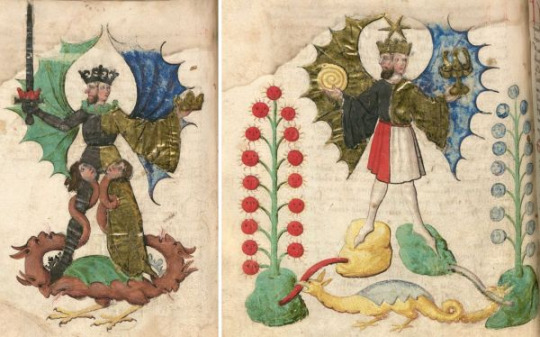
The first chemical wedding is usually somewhat violent, primitive even, whereas the second one signifies the creation of the stone. However, characters can have more than two weddings, and chemical weddings do not inherently have to be romantic--Sam and Frodo aren’t, for example--but most often are, because it’s the most obvious way to show a union between separate people (the old adage “two become one” in marriage, for example).
If we look at George Ripley’s 12 Gates, chemical weddings tend to be focused on in the fourth stage of conjunction (which I wrote about here) and in the ninth, fermentation (which is probably going to be in volume 10--maybe a little in volume 9, but traveling between worlds seems to be a hallmark of sublimation in fiction so I’m guessing we’re stuck there for the time being). But in a lengthy series spanning eight years and counting, there is going to be overlap.
So let’s talk about chemical wedding imagery historically. It tends to involve dissolution (via water or fire--keep in mind metal was associated with fire in olden days, so stabbing with metal was considered liquid fire, or so it was believed to be by alchemists) and then coagulation (healing/coming together).
Four of the five ships--two of whom are definitely happening, one of which I think is happening and one of which I think has a good chance--reference historical alchemical artwork and symbolism in key moments. (RWBY does reference alchemical artwork; see here and here.) So let’s dive in and examine potential chemical wedding allusions in RWBY:
Lie Ren/Nora Valkyrie (Renora)
Let’s start with the most obvious couple: Ren and Nora. Their first chemical wedding occurs when they are children. In alchemical art, birds are often used to show the volatility/primitiveness of a first chemical wedding:
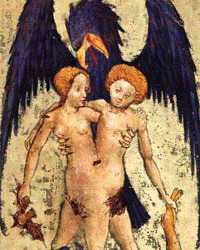
The raven is replicated in the Nevermore which forms a similarly threatening pose over Ren and Nora when he unlocks his semblance to protect her, thus honoring his father and mother’s legacies.
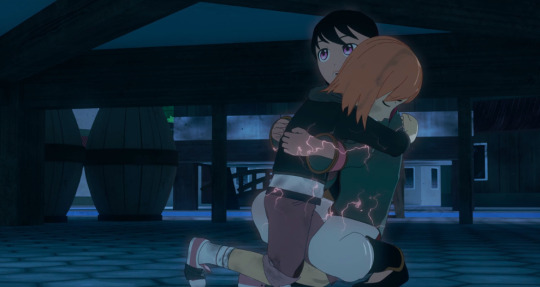
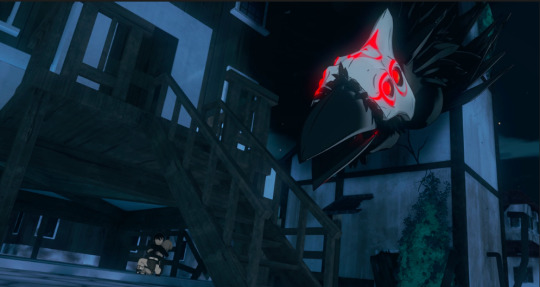
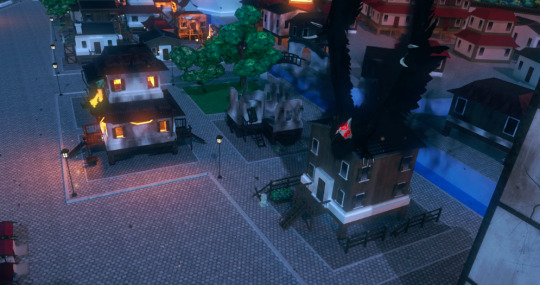
You can even see earth (trees), water (river), fire, and air (the bird flying) in the scene as it pans out. After this, Ren and Nora become “Ren and Nora,” as Nora herself says in Volume 8. They’re inseparable, because they’re on their way to becoming one. However, unification doesn’t mean that they’re literally the same person; in stories like these, it’s more like they become better versions of themselves through growing towards each other and adopting each other’s traits (like Nora’s courage for Ren, and Ren’s caution for Nora).
Their second, elevated chemical wedding is in the same place as their first, when in Volume 4 they return to the village and defeat the monster they were too young to defeat last time. This time, Nora is the one who protects Ren by telling him he could not sacrifice his life by pulling Ren back, in a reversal of his running to her in their first moment years ago.
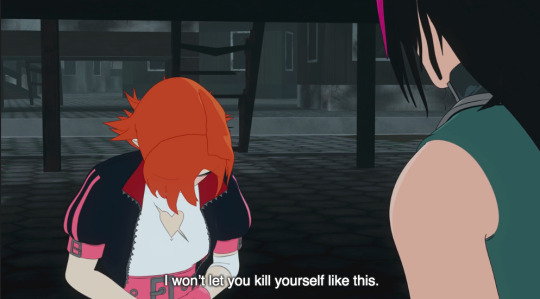
Like the first, there’s water involved--Ren and Nora hide next to a river, watching as the Knuckelvee advances on them. I talked previously how I thought this looked like a possible allusion to this alchemical image (look at the moon symbol on the head of the aggressor):
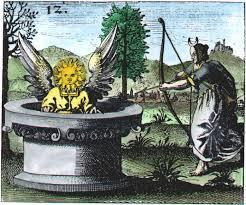
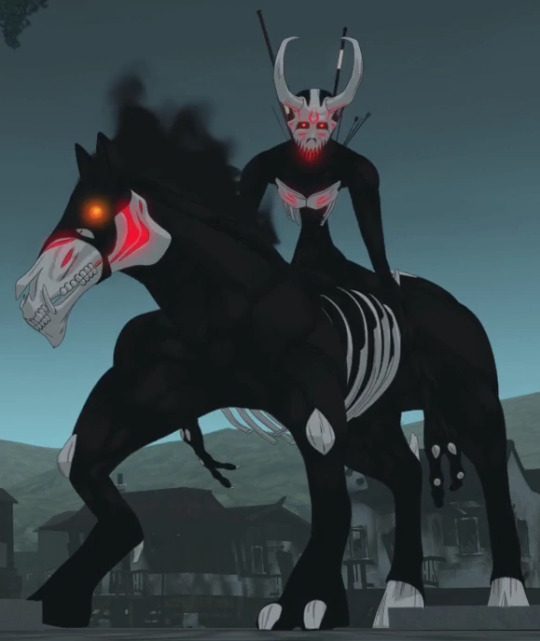
The moon symbol actually shows up quite a bit in this scene, first when Nora and Ren discover the Nuckelvee is still alive in the cave:
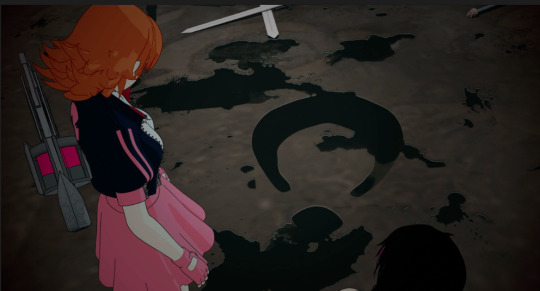
And then in the moment when they defeat it:
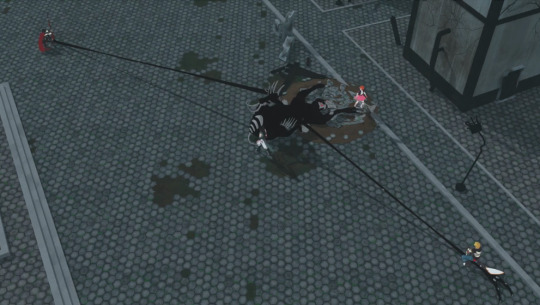
While I am certain this is a chemical wedding, I’m not certain why the moon symbol is so prominent in this, though I do think it is possibly in reference to this image and how Nora and Ren are united now:
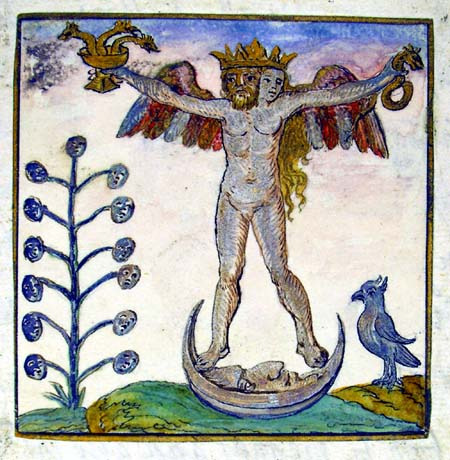
Yang Xiao Long/Blake Belladonna (Bumbleby)
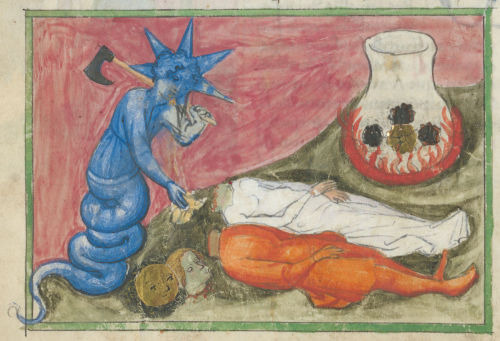
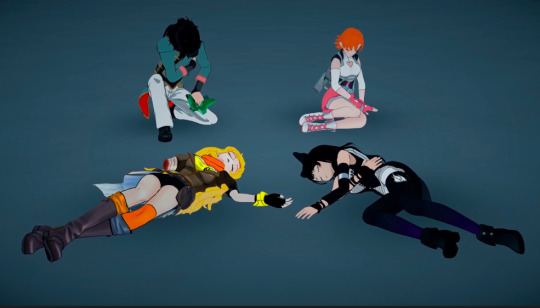
Firstly, the alchemy image is somewhat of a creepy image, right? In this, Mercurius has united the two principles by beheading them (amputation is a Thing in alchemy), leaving them to putrefy and then coagulate.
Like the Nuckelvee for Nora and Ren, Blake and Yang have a somewhat antagonistic Mercurius who unites them: Adam Taurus. He doesn’t cut off their heads, but he does seriously injure Blake and cuts off Yang’s arm in a scene that is romantically charged (you have Blake’s possessive ex telling her he’ll target someone she loves and specifically chooses Yang).
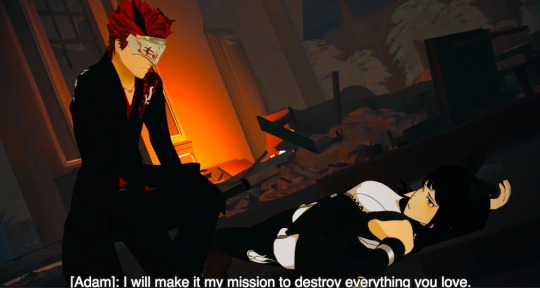
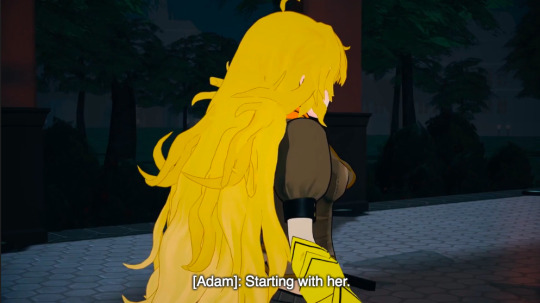
While I have my issues with how Bumbleby is written, it’s hard to interpret that as anything other than him seeing Yang as a rival for Blake’s affection.
Their second chemical wedding also involves Adam. There’s no one direct image that seems to have inspired it, but it does take place in a place full of waterfalls (fountains and flowing water in general, like the ones in Nora and Ren’s village, are common elements of chemical weddings’ settings) and by the ocean (the “mercurial sea” is where the elements dissolve to make the Philosopher’s Stone, so it’s also a common hallmark for chemical weddings).
(To briefly address this: this is where my complaints about the writing pile in, because you can also make a damn strong case that Blake and Sun fighting on the ship to Menagerie is a chemical wedding, which it is, but I think it’s clear at this point that Bumbleby is endgame. Either both were written for a reason, like if they weren’t sure if they could do Bumbleby, or a narrative reason, in which case Black Sun should have been dealt with rather than hand-waved away, or they were just teasing, but baiting fans is never, ever good writing; it’s cheap. All that to say that while I think there’s a compelling case they were interested in pursuing Bumbleby from the start, Black Sun shippers have a right to feel tricked and not all criticism thereof is based in homophobia or a lack of narrative understanding, or even in a dislike of the ship.)
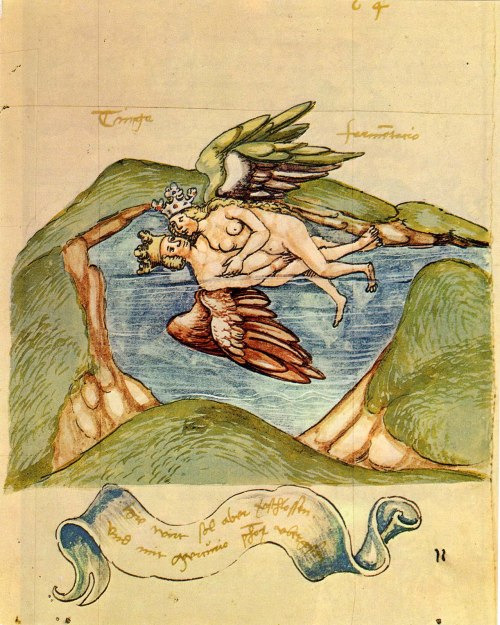
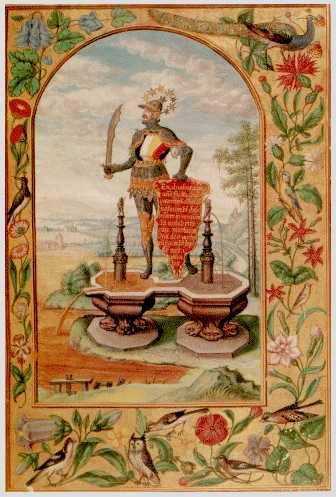
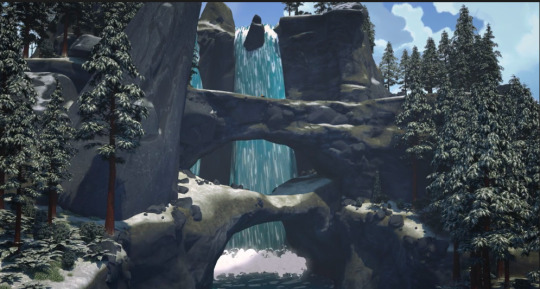
At the beginning of this scene, Adam makes it clear that this is a redo of their previous chemical wedding by reminding them of it:
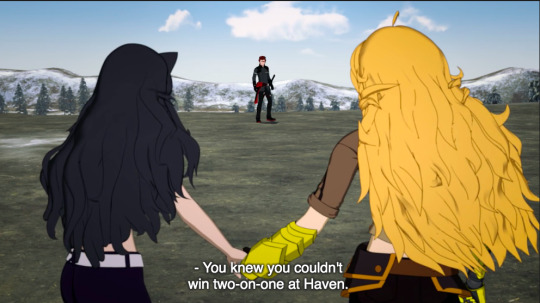
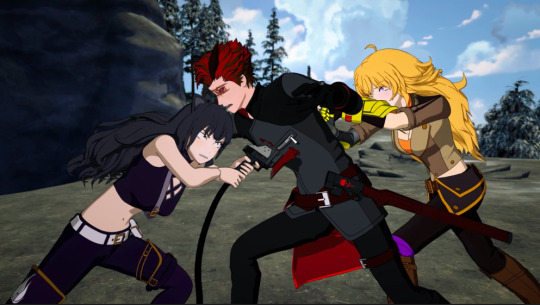
Blake stabs Adam with a silver weapon; Yang with red. We have earth, air (clouds), water, and weapons as a stand-in for fire.
It’s still somewhat of a violent wedding, which makes me wonder if Bumbleby will have a third (and Renora as well). But it also parallels Renora in this: returning to a pivotal scene where they were traumatized, but this time being able to overcome it because they’ve become more like each other. Blake is in many ways Yang’s trauma stretching far beyond Beacon (Blake runs away, as does Raven, Yang’s mother who abandoned her), and likewise Yang for Blake (she’s hotheaded and holds grudges, like Adam). But Blake and Yang have been working on becoming better versions of themselves.
At the end of this scene, they even exchange quasi-wedding vows (since Blake’s promise is to not abandon Yang):
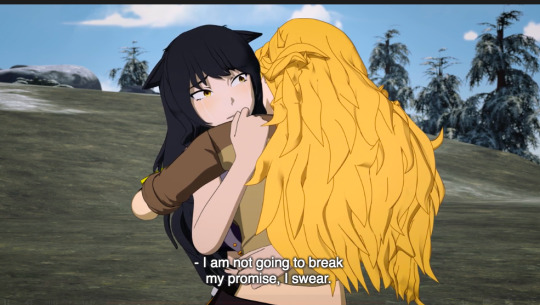
And the artists drive home the point by drawing Blake’s hair far bushier than normal (more like Yang’s), and Yang’s far tamer than normal (like Blake’s).
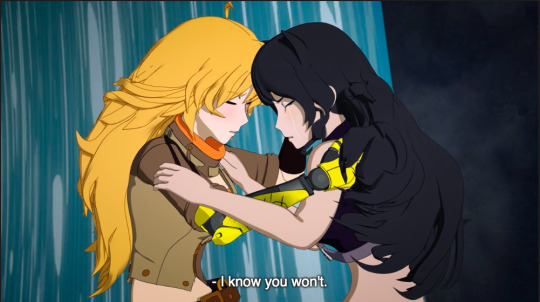
Jaune Arc/Weiss Schnee (White Knight)
Weiss and Jaune have had one chemical wedding thus far (possibly two but not sure) and I didn’t ship them at all until I saw this scene. Like Bumbleby and Renora, they have an antagonistic Mercurius: Cinder.
(This one I’ll be arguing a little bit about why I think it’s set up for romance as well.)
In this scene, Cinder directly compares Weiss to Pyrrha in regards to how Jaune feels about them (and we know Jaune and Pyrrha were romantic--you can also argue Cinder was an antagonistic Mercurius uniting Pyrrha and Jaune).
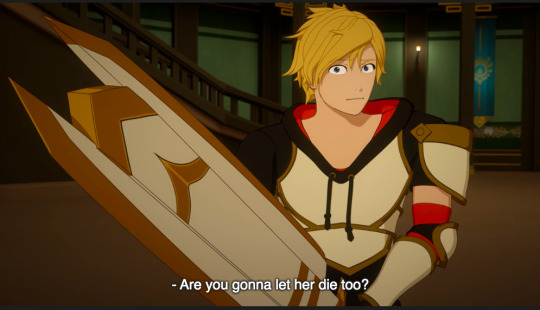
When Weiss screams, Cinder gets an idea and slides her gaze from Weiss to Jaune.
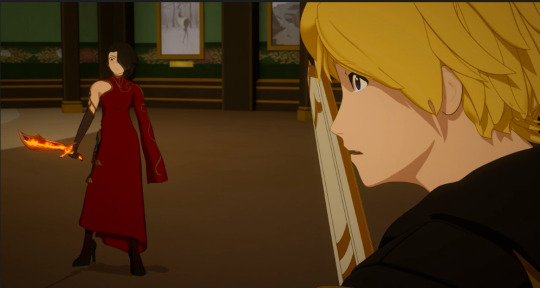
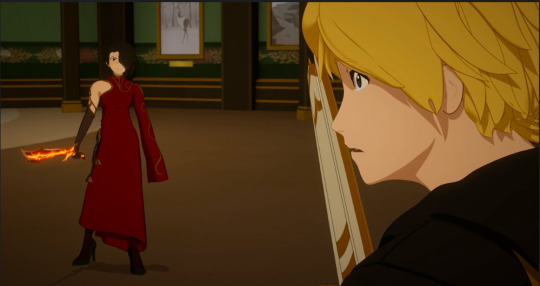
And then reenacts this:
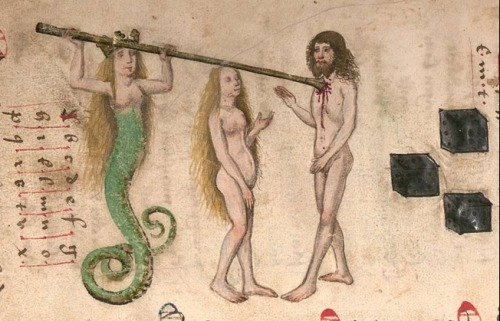
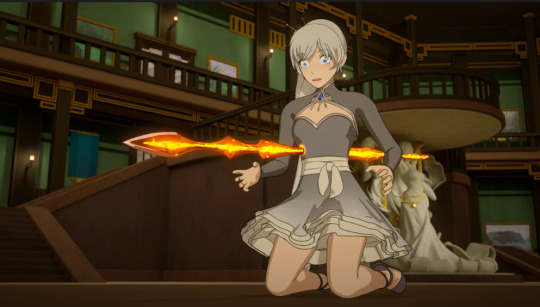
As I also mentioned previously, Jaune then plays the role of the Prince to Weiss’s Snow White (which is an alchemical fairy tale). Like when Ren unlocks his aura to protect Nora, Jaune unlocks his to save Weiss. Weiss looks as if she is in a glass coffin that gets more and more golden, symbolic of refinement.
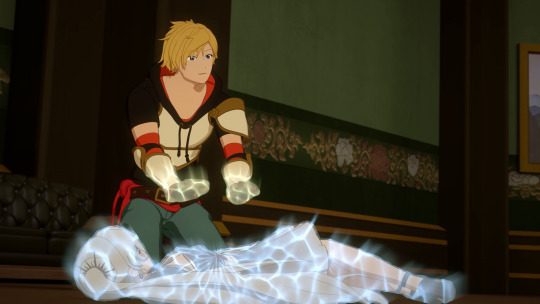
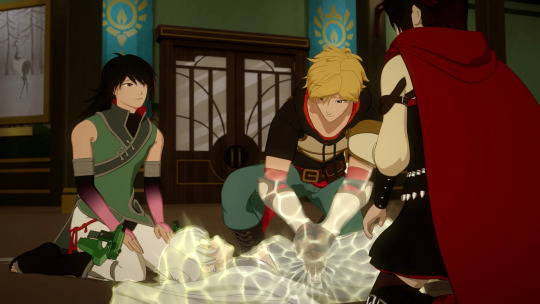
It’s also probably an allusion to this image of a chemical wedding presided over by Saturn (Mercury in this scene, since he’s there) and Death (Ruby and Qrow, who are also present in the scene with Jaune and Weiss). (For more on this image, see here.)
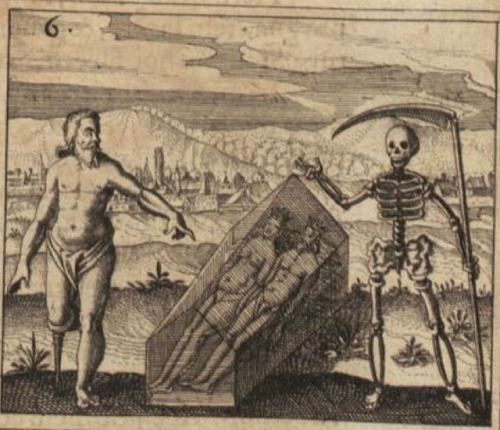
Weiss and Jaune also have some oppositional imagery and arcs: Weiss starts Beacon with a deep family legacy and an inherited semblance, she chooses to go to Beacon on her own and is the favored child (at first). Jaune too has a family legacy of warriors, but instead of feeling empowered because of this, he is insecure and literally cheats his way into the school. He doesn’t have a semblance until season 5. After this incident, Weiss and Jaune spend some time recreationally together (seeing a movie in vol 7); Jaune becomes more confident as a leader, and Weiss continues her arc in becoming more sympathetic to those from less privileged backgrounds.
Arguably, what happened at the end of volume 8 could be seen as having some symbolism of a chemical wedding for Weiss and Jaune too, but I don’t think it actually is one since they weren’t focused on as characters enough (if this was intended to be the start of one, we’ll get something next season, I’d imagine). The only reason I’m mentioning it is because it does function as an inverse of the previous one, which is the case for Renora and Bumbleby’s first and second weddings too. Cinder again almost kills Weiss (she falls in the exact same position as in vol 5), but Jaune saves Weiss when he screams after killing Penny. Instead of saving Weiss by healing, he kills. There’s also some distinctive red and white imagery.
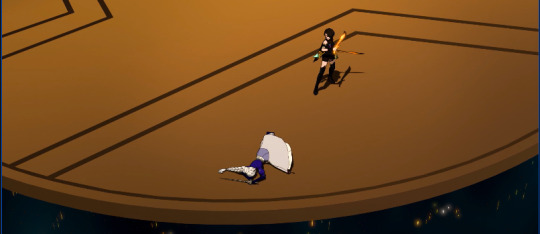
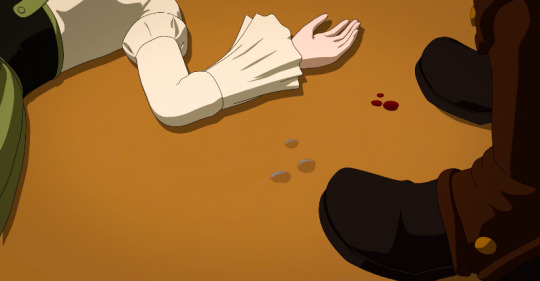
And then Winter arrives with a six-pointed star and birds before telling them to run together:
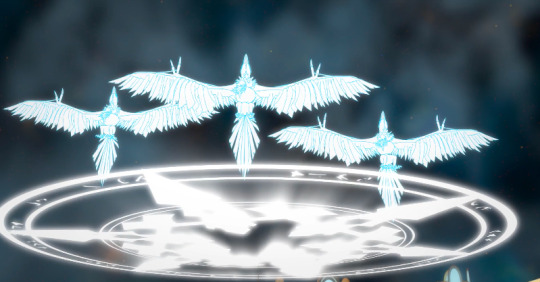
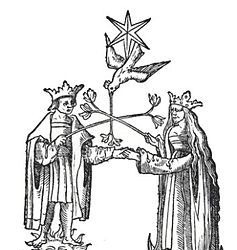
But again, I wouldn’t really call this one; it just has some imagery of one and fits a pattern, so I’m including it as a potential lead-in to an actual one in the void or later.
Ruby Rose/Oscar Pine (Rosegarden)
Like with Weiss/Jaune, I’ll be arguing a little bit about why I think this one is likely to end up romantic, too (for example, Cinder most recently in volume 8 used Oscar to taunt Ruby in a callback to using Pyrrha and Weiss to taunt Jaune).
Also: oh look, finally a wedding that isn’t violent. They just... meet. Which is also normal for a chemical wedding but less dramatic.
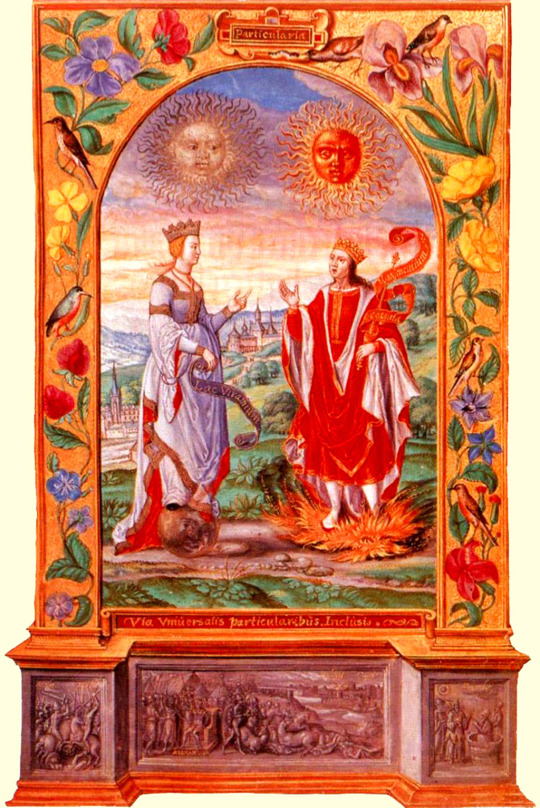
Behold, the bird uniting the solar king and lunar queen:

(Fun fact: unless CRWBY came up with ship names which I highly, highly doubt, this is pure coincidence, but it’s a funny one: the art series this image is taken from is called Rosarium Philosophorum--which literally means “rose garden philosophy.”)
Let’s look at the scene where Ruby and Oscar meet for the first time. What makes this a chemical wedding is in part how obvious their markings are and the overall imagery is in the scene.
They are united by Qrow (who in addition to being named after a bird can literally transform into a bird):
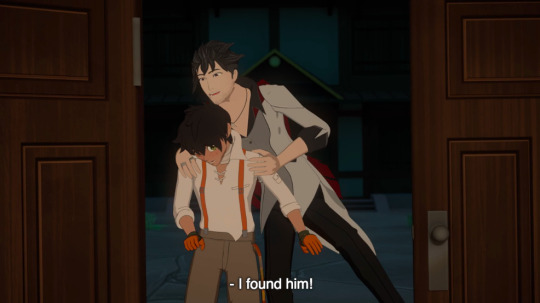
Oscar asks about Ruby specifically (yes, I know because Qrow’s her uncle, but the writing is telling us to focus on his relationship with her):
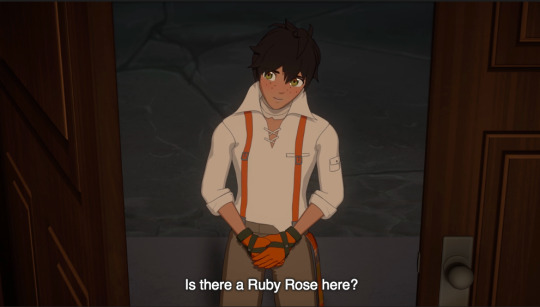
And immediately notes/is in awe that she has silver eyes (i.e. the moon):
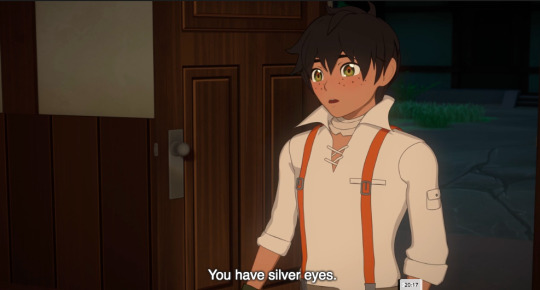
Qrow seems to realize he’s done something momentous in a way that almost doesn’t entirely work within the frame of the narrative (but he is drunk, so).
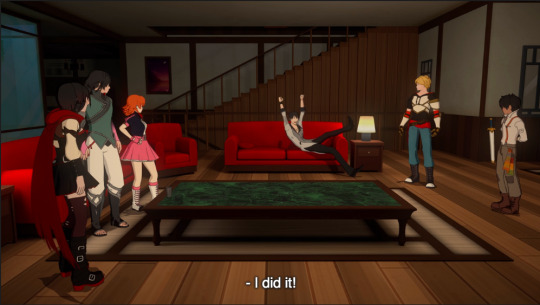
The scenery of this room is also telling. The table is literally an Emerald Table, the legendary foundation of alchemy itself.
Once they sit and talk, behind Oscar are the elements of earth and water, which he represents, and also the moon, which while traditionally associated with earth and water, he does not (at least not as strongly as he’s associated with the sun/gold):
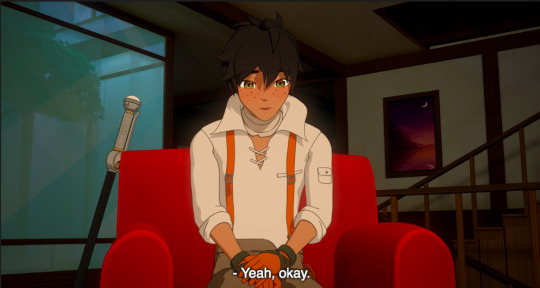
Similarly, behind Ruby we have the elements of fire and air (like, if you zoom in, they actually drew air), which she is marked as, and the sun, which again, she’s not as strongly associated with as she is with the moon:
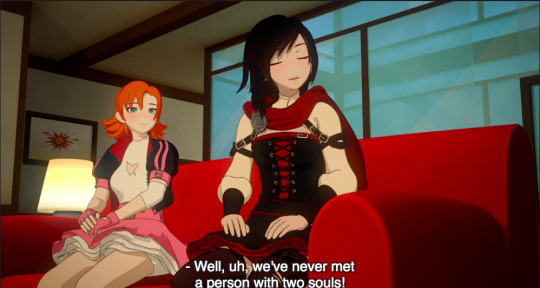
In Splendor Solis, which CRWBY has referenced before, the Solar King does eventually end up grounded in the moon, and likewise the Lunar Queen in the sun:
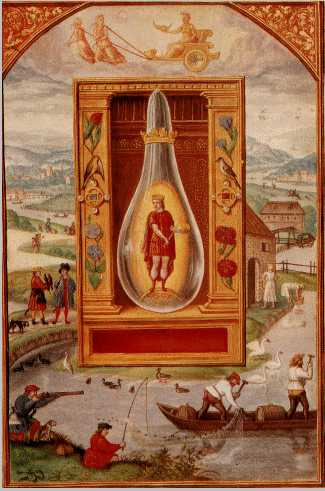
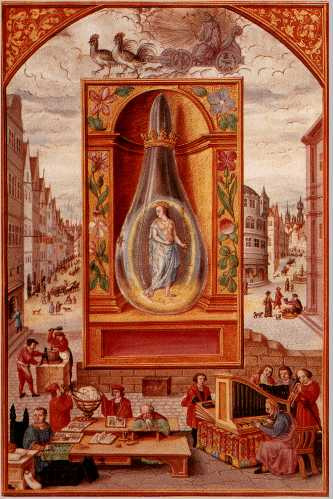
Oscar and Ruby also do have oppositional arcs and roles: Ruby starts the series in the very first episode by being invited to Beacon two years early because of her leaping into action to stop Torchwick. She’s scolded for her recklessness, but immediately picked out as special because of her silver eyes. In contrast, Oscar is reluctant to leave his farm once Ozpin inhabits him; he refuses at first, and then once he does leave, is nervous and timid.
Anyways I wouldn’t be surprised if Qrow arrives in Vacuo with RWBYJ in tow and this time reunites Ruby with Oscar in an inverse. We’ll see.
I do want to say that I also see potential for Emerald Sustrai/Mercury Black, in that they often act as one and share a theme song, but I haven’t seen any actual visual references to a chemical wedding for them... yet.
#rwby meta#rwby theory#rwby volume eight#rwby vol 8#rwby volume 8#rwby volume 9#weiss schnee#jaune arc#ruby rose#blake belladonna#yang xiao long#lie ren#nora valkyrie#oscar pine#alchemy#rosegarden#bumbleby#renora#white knight
156 notes
·
View notes
Note
hi!! i've been reading through your ao no flag liveblogs lately and they're really interesting! i enjoy seeing someone so passionate about this manga and it makes me want to reread it .... i'm really interested in hearing what you have to say about masumi's ending though!! part of me thinks it makes sense but i'm mostly conflicted on it and would love to see it from your perspective ^^
haha well thank you! ah yes, the arc that created as much controversy as you can get in an active readership of like 10 people...
Blue Flag is an imperfect story, but it also gets a lot of flack for things that a) didn't...actually...happen, b) didn't happen in the way people think they did.
Part 1: Is it actually straightwashing?
The most common criticism I see of Masumi's ending is that she was written as a lesbian character and straightwashed at the end. Marrying off a female character as a way to 'fix' her issues is a common and harmful trope, and saying that lesbian women just need to get a man is a widespread homophobic trope and talking point. So, it's not a good look. To have a character angst over interest in a woman and end up happily married to a guy reads like a '50s pulp novel that just uses f/f attraction for marketing.
But, if the intention of the ending was to show that Masumi should give up on women and force herself to date men, then it doesn't. Mitsuyuki's description of her is 'look at my bisexual wife who has dated both women and men and could also have married a woman', which is an odd choice if the intention was straightwashing. It feels more like a clumsy way to make sure that, in a series full of ambiguity, there could be no argument that Masumi was queer. That isn't to say that cisstraight people don't view bisexuality as less/better than/straighter than her being lesbian and that making a previously gay character bisexual isn't still straightwashing (increasing the appearance of straightness).
Part 2: Was it actually a retcon?
So: Masumi's ending reaffirms that she's a WLW. One question is, was she always meant to be bisexual, or was she originally written as lesbian?
Blue Flag doesn't have a lot of straight (no pun intended) answers. Taichi never expresses any explicit attraction to guys, but there is enough subtext to suggest he's attracted to Touma well before the finale. Futaba believes she is attracted to Touma at first and is shown to be attracted to him using the visual shorthand of manga (blushing, etc.), but she later says that it was just misinterpreted admiration. Mami doesn't want to date Touma or any man, but she implies that she is attracted to Touma when she says around him she was 'glad to be a woman.' Within the main romance, Futaba says that it was specifically because Taichi was a friend to her that she grew to like-like him. The lines between friendship and romance are blurred in Blue Flag, and sometimes romance can only grow out of friendship.
Masumi has a tense conversation with Taichi in the first half after she breaks up with her boyfriend that most people (me included) read as her saying that she tried guys and she just isn't and can't be attracted to them. However, it's Blue Flag, so the conversation is unfocused and doesn't paint a complete picture.
"Even if I get a boyfriend, I can never make it work"/"I don't know why [I don't like him anymore]" seem to imply that Masumi realized that she was feeling compulsory heterosexuality and that she will never like men. "[I don't know] why he like someone like me"/"You can be friends with potential sexual partners? With both guys and girls?"/"I just wanted to hear how you men feel about [a girl liking other girls]" seem to imply that Masumi is bisexual and is afraid to date because someone might find out. Maybe she's written as questioning--she knows she likes Futaba, but she's feeling out other possibilities. It's Blue Flag, so it's unclear.
Part 3: How does it work with Masumi's arc?
Diving further into Masumi's story, she acts as a foil to Touma (and Futaba, see later). Touma feels free to show his affection for Taichi as a friend as well as a love interest and almost confesses to him of his own free will, well before he's forced to. Touma tells her that he intends to try and set Taichi up with Futaba (because they would be good for each other), and also that he intends to pursue Taichi in some way. He tells her he's "not like [her]."
For Masumi's part, she tells Touma that she wants to express more affection for Futaba--not necessarily in a romantic way, just to participate more fully in that relationship--but she's afraid to, she doesn't feel confident enough to try, and that she's "the worst" because of it. We see this theme repeated, that Masumi is pessimistic, is afraid to trust people and hates herself for being afraid. Her conversations with Aki and Mami explore this; Aki tells her that it's not bad to be insecure or unready and that it's fine to keep a secret/stay closeted until she's ready, Mami tells her that she does have people she can trust, who care about her and who will do their best to understand her and help out. Why am I typing all this out? Because Masumi is a bitter, insecure wlw and that is an Established Trope, but her twist on it is that her negativity or bitterness isn't over her attraction to women/to Futaba or even over the reaction she might get from others (as Touma's is), it's over her own insecurity. Like Futaba, she's hesitant to act on her feelings, and like Futaba, she gets frustrated and hates herself for her own inaction.
All that is to say--Masumi is never shown to have a problem with her attraction to women. Her angst isn't gayngst, she's not ashamed of her feelings for Futaba bur rather her inability to express them. Her problems are with social attitudes and more with her own personal feelings--she and Touma face similar problems, but Touma is simply aware of the consequences (being roughed up and ostracised by a certain group of people) while Masumi feels a more generalized and ambiguous fear.
If Masumi were shown to have mixed feelings about her queerness/were shown to be in denial/were shown to be trying to move on from Futaba, then her ending would read more as straightwashing. As it is, there's nothing in her character and arc to say that she'd ever want to erase that part of herself or get rid of it, rather, she wishes she could embrace it but she just doesn't feel confident in doing it. Her ending shows her as an openly bisexual woman who is out to her friends and husband at the very least, which is a completion of her arc in the manga (of learning to trust other people and express her feelings honestly).
Part 4: What context clues does the rest of the series give us?
This is branching off a little from the strict text of Parts 1-3. As I've said, as we know, Blue Flag is 50% subtext and interpretation. Characters speak, but they don't say what they mean, characters think, but they're not always honest with themselves or in tune with reality. Mami is an ominous and antagonistic figure in the first half, but then it just turns out that Taichi was jumping to conclusions. Taichi is the main character and narrator, but we get radio silence from him for like 7 chapters after the climax. Taichi is bisexual, but the reader has to guess that from the way the art style shifts between PoVs, the similar panelling between Futaba and Touma's confessions, the things he does and does not think about Touma and how he feels about them. It's safe to say that there is room for speculation.
First, there is no explicit evidence that Taichi could be bisexual before ch 54. It's easy to tell that he is, but again, there's nothing specific. Some people reading Blue Flag have said that him marrying Touma was out of character, unforeshadowed, bizarre, inexplicable, etc. because their experienced is coloured by their own heterosexuality. Masumi is shown to have dated a guy and in saying she didn't like him "anymore," implied that she did like him. Her conflicted feelings over her bf could well have been foreshadowing her liking men as well, and my reading that as comphet could have just been my own experience colouring the text. Who knows! Taichi's bisexuality was intentional from the start but could be read as a last-minute twist, so why not Masumi's?
Second, Mitsuyuki is Futaba 2.0. Same colouring, same personality. This could feel like a way of saying "Masumi just needs to like guys instead," but to me it reads deeper with some of the trans subtext around Futaba. One of my issues with Blue Flag is that it doesn't go further into Futaba's admiration/envy for masculinity and her uncomfortable relationship with femininity. As a cis woman who wants to be buff and mildly masculine, I can understand why she's a cis girl throughout and I don't necessarily think that she was supposed to be a trans guy. However, her relationship with masculinity draws a parallel to Mitsuyuki. Reading Mitsuyuki as a cis man, he is the combination of Futaba's personality and looks with her 'ideal form.' So, Masumi marrying Mitsuyuki can read as Masumi marring Ascended FutabaTM.
Third, Futaba having a faceless prop husband is interesting in the context of Mitsuyuki getting a name and personality. Mitsuyuki = Futaba and Mr. Kuze is a blank space, so the reader is prompted to reduce the scenario and slot Masumi into that blank space. Given Masumi and Touma's history as foils, I'm inclined to think that Mitsuyuki exists to show the road not taken. Back at the fireworks, Touma tells Masumi that he hasn't given up on Taichi, and Masumi says she doesn't intend to pursue Futaba even though the pining is making her miserable. Given that Futaba reacts a lot better to the idea of Masumi liking her than Taichi reacts to the idea of Touma liking him, given that we see Masumi has successfully wooed male!Futaba, I think that Masumi's ending shows that she could have ended up with Futaba if she chose to pursue her. She didn't and she still got a happy ending where she is confident in her sexuality and unafraid to trust, but she could have also had a happy ending where she married Futaba. Mitsuyuki is a man because desire-for-masculinity is a key aspect of Futaba's character, and Mitsuyuki is a named character with a personality because KAITO wanted the reader to know that Masumi could have ended up with Futaba (as Touma ended up with Taichi).
Fourth, KAITO's notes on volume give us a few hints. He comments that there was remarkably little interference with his story and that he was able to tell it as he wanted, and that the ending was meant to be a "question" to the reader. The way I see it, Masumi's ending wasn't meant to say "maybe you'll be fixed if you get a man" but rather was meant to complement Taichi's ending and say "things happen in ways you might not expect, but that doesn't mean they're bad."
Fifth, Touma/Taichi ending up together shows us that the series is willing and able to show queerness as a good thing and a happy ending, so it's unlikely that Masumi was meant to come off as "actually she just needed a man" and more as "life can be unpredictable but you can always find happiness"
Summary
It's unclear whether Masumi was written as a bisexual woman or a lesbian woman or a questioning wlw
I personally read her as a lesbian and I wish that part of her character had gotten more exploration
Masumi's ending wraps up her arc (struggling to trust other people with her feelings in general and her queerness in particular) in a satisfying and logical way
Masumi being bisexual does not in any way negate or lessen her identity and experienes as a wlw, bisexual people still face external and internalized homophobia and all the associated issues
Masumi's bisexuality may well have been foreshadowed, but the execution makes it easier to read her as a lesbian, which makes her ending seem like a homophobic cop-out in the style of the Hays Code
Masumi's ending doesn't straightwash her and goes to unusual lengths to affirm her attraction to women
Masumi's ending seems to be written to contrast Touma's ending, showing that getting or not getting the love interest depends entirely on whether you choose to pursue them
It's unlikely that authorial intent was to straightwash Masumi
#ao no flag#blue flag#itachi masumi#masumi itachi#kelsey liveblogs ao no flag#that 8 volumes of a manga where nothing happens could be so complicated...
61 notes
·
View notes
Text
ranking hsmtmts characters bc i’ve got nothing more important to do

14. lily
she’s just plain annoying and i want her to get off my screen every time she’s on it.
hope she’s not in season three and if she is she’s not redeemed (make her even more evil, then maybe she’ll be interesting).
[this is just about the character of course, nothing against the actress]
13. miss jen
i was finally starting to like her in the beginning of season 2 but the last few episodes reminded me how infuriating she is. i don’t like how she treats her students and the fact that she doesn’t have teaching credentials doesn’t help.
12. ricky
it’s not that i hate him i actually like him sometimes, but he’s so oblivious and gullible. give this boy some therapy then maybe we’ll talk.
11. nini
she’s alright. but we see so much of her and yet so little of the important stuff that would actually make her interesting. i support and respect her and all, i just don’t really care about her.
10. natalie
hello where’s her screen time? episodes 10&11 proved she deserves it.
9. big red
he’s just kinda there. i like the actor but i’m not that invested in the character’s storyline.
8. carlos
respect him a lot. but the show doesn’t give him enough plot line for me to care.
7. seb
love him bc he’s a sweetheart but him and carlos are in the same boat (or should i say ship) when it comes to screen time. the show remembers they exist once every 5 episodes, so they’re just kinda there in the background.
6. howie
he’s so high up bc he intrigues me. i’m certain that he’s a good guy but i guess the finale will settle it for me.
5. kourtney
i’m glad that this season she’s not just a supportive black friend and gets her own storyline. although i wish we’d seen more of her at work & pursuing her dreams instead of only witnessing the howie drama (and even that mostly in the background).
4. ashlyn
ash was consistently great from the beginning. love her bond with gina and need more of it.
in some ways she reminds me of phoebe from friends because she’s a multitasking queen and apparently likes to stir up drama (bc wth was that deal with the chocolates).
3. mr mazzara
even though he was sort of an antagonist in season one (for like 4 episodes) and he said a few nasty things, since his first scene, i liked his presence and comedic timing. in season two he completely won me over. he’s just someone who can do no wrong at this point. and his relationship with ej is amazing. so yes he’s in the top 3.
2. ej
ej could’ve be an unlikable character but matt cornett is portraying him so well it’s impossible not to like him. he was definitely one of the most surprising character development wise. although he was my second favorite since day one, regardless. his story arc was one of the best. he is the best male character. now, i’m kinda scared to lose him next season. and also, portwell for life <3
1. gina
do i even have to say it? she’s a queen and everyone should bow down to her. should’ve been the main character idc.
sofia wylie was the reason i started the show and gina became my number one the second i saw her in the background. finally this season has been giving her all the screen time she deserves and i couldn’t be happier. gina is one of my all time favorite comfort characters.
#tv show rant#tv show review#tv shows#hsmtmts#high school musical the series#portwell#gina porter#ej caswell#ranking#top favorite#favorite characters#top tier
31 notes
·
View notes
Text
Differences between the book and the movie - supplemented -
I recently read a Fanpop article that gathered the most obvious differences between the book and the movie. https://www.fanpop.com/clubs/blood-and-chocolate/articles/30840/title/differences-between-book-film
• The general message of the book is that werewolves and humans cannot have stable romantic relationships because humans cannot love all of what a werewolf is; as a result, Vivian chooses her own kind by becoming Gabriel's wife. The movie states the exact opposite, as Vivian kills Gabriel and chooses Aiden over her pack.
• In the book, all characters are American and the story takes place in Maryland. In the film it takes place in Romania and some characters have English, French or Romanian accents. Vivian and Aiden are the only characters with American accents.
• In the novel, none of the wolves' eyes change to gold when they smell the scent of blood.
• Vivian's mother Esme is alive and her father dies in the novel; in the film both her parents are dead. In the book Vivian is an only child, but in the film it is shown that she had siblings, who were killed along with her parents.
• In the film Vivian blames herself for her family's death; she explains to Aiden that her paw prints were found by the enemy, leading them to her family. In the book, only her father dies and it was caused, albeit indirectly, by the Five.
• Aiden, Vivian, and the Five are all high school students in the book. In the film, Aiden appears to be older than Vivian, who is nineteen, and the Five appear to be in their late teens to early twenties.
• In the book, Astrid and Gabriel were never mates. Rafe is not their son nor is he Vivian's cousin. Astrid is not Vivian's aunt and is actually the main antagonist in the book, but in the movie she takes on the role of Esme, Vivan's mother in the book.
• Rafe and the rest of the Five romantically pursue Vivian in the novel, and she and Rafe had dated at some point before the story takes place. This is not mentioned in the film.
• Rafe and Astrid are lovers in the novel; in the film they are mother and son.
• In the film there is no Ordeal between the male loup-garoux, and no Ordeal between the female loup-garoux. Gabriel is the leader from the start, instead of participating in the Ordeal as he did in the book. In the film leadership of the pack is based on bloodline rather than triumph.
• In the beginning of the novel, a character named Axel - a friend of the Five and Vivian's former romantic interest - was mentioned several times. Axel does not appear in the film.
• In the novel, it was Axel, and not Rafe, who murdered a girl because she rejected him.
• Vivian has an Uncle Rudy, Esme's brother, in the novel. In the film, she has no uncle.
• Vivian works at a chocolate and sweets shop in the film; she has no such job in the book.
• In the novel, when the pack leader takes a mate, she is his mate for life unless another female loup-garoux challenges and defeats her. In the film, the leader takes a new mate every seven years.
• Vivian is presumably a gray and brown loup-garou in the book. However, in the film a white wolf was chosen to depict Vivian in her wolf-form.
• In the book, there is no prophecy.
• The book mentions an elderly female loup-garou, Aunt Persia, who cures every ailment the loup-garoux may have including Vivian's silver poisoning. In the film, she is not mentioned and an old pharmacist gives Vivian an antidote.
• In the book, Aiden gives Vivian a silver pentagram, which he later melts down into the bullets he shot Vivian and Rafe with. In the film, Aiden owns a pentagram necklace that he uses to kill Rafe.
• In the book, silver can only kill a loup-garou if it enters his blood stream. In the film, a loup-garou need only touch it for poisoning to occur.
• In the book, Vivian's parents had been the leaders of the pack before Gabriel, but the film never mentions this.
• When Vivian reveals her secret to Aiden in the book, he is terrified and wants nothing to do with her. In the film, Aiden initially feels that Vivian betrayed him and leaves her, but he reconciles with her after she saves him from the other loup-garoux.
• In the novel, the pack members shape-shift into their alternative forms. In the film, the transformation is much more spiritual, depicting Vivian and the others as humans who almost seem to ascend into a higher (or at least different) state of spiritual being, glowing mystically as they transform into wolves.
• In the book, Vivian enjoys changing into her wolf form, and does so frequently. In the film, she struggles to prevent the change and only does so when necessary to save Aiden from the hunt.
• Gabriel is twenty-four in the novel; in the film he is of indeterminate age, though clearly old enough to have fathered Rafe with Astrid.
• In the book Gabriel truly loves Vivian, but in the film he wants to marry her to fulfill the prophecy.
• In the film, Vivian shows a great amount of resistance to "Tradition" and Gabriel's laws, whereas in the book, Gabriel explains that he loves her because she cares so much for her pack.
• In the book Aiden and Vivian break up at the end, and Vivian falls in love with Gabriel and agrees to become his mate. In the film, however, Gabriel is killed by Vivian and she leaves the pack with Aiden.
• In the film, Aiden's last name is Galvin, while in the book, it is Teague.
• In the film the pack participate in special hunts, which take place in a forest. The prey is human, usually one who has done wrong to the pack, and is told that he must run through the forest in order to win his life back - if he passes the river in the forest then he can survive, if he is caught by a loup-garoux then he is killed by it. In the novel, however, there is no such practice since Gabriel does not advocate the killing of humans.
The other differences have been collected by me, let's make it welcome! (Repetitions may occur)
• In the novel, a leaderless, disarrayed pack tries to choose a new leader while Vivian is dating a human boy. When Vivian finally breaks up with Aiden, she realizes that Gabriel is the one she really needs, so by the end of the story, the two will be the leaders holding the pack together. By the end of the film, the pack (and the Five) are falling apart, in part because of Vivian and Aiden's relationship.
• In the film, Gabriel (and most of the pack) is the hurdle, and Astrid shows empathy by understanding Vivian’s point of view; while in the book, the supervillain is Astrid who tries to put Vivian out of the way by manipulating Rafe, and Vivian was saved by Gabriel. He then kills Astrid for endangering the pack.
• Rafe is killed by a silver necklace around the middle of the film; however, he dies in one of the last chapters of the novel where Aiden shoots him with a silver bullet.
• Since Vivian, Rafe and the other members of the Five are all high school students in the book, much more detailed information is available about them, from their family backgrounds to how they relate to each other. Finn and Willem are originally twins, and Gregor is their cousin. The twins' and Gregor’s father are brothers called Rolf and Raul Wagner. In the book, Gregor is blonde and is the tallest - in the movie, Ulf’s character has a similar look, who, in the book, is Astrid’s son and has the same red hair as her.
• Vivian has blonde hair in the film, but in the book her hair color is described as tawny which is a light yellowish-brown color. Rafe is seen in the movie with chin/shoulder-length golden brown hair, while all that is known in the book is that he has "long brown hair." Aiden is originally a teenaged gothic-hippie poet boy with shoulder-length dark brown hair and dark, dreamy eyes, but in the film version he has a typical “starving artist” look with shorter hair and blue eyes.
• Of the five boys in the book, Rafe is the only anti-hero, but the others are on Vivian’s side, and their friendship will remain unchanged by the end of the story. In the movie they seem to turn against Vivian or hinder her from achieving her goals.
#bloodandchocolate#bloodandchocolate2007#bloodandchocolate1997#bloodandchocolate movie#bloodandchocolate book#differences#bloodandchocolate rafe#bloodandchocolate vivian#bloodandchocolate thefive#bloodandchocolate rafexvivian
3 notes
·
View notes
Text
in search of a better dream
This is about three pieces of South Korean media that crossed my path recently: the dramas Search WWW and Flower of Evil, and the novel Kim Ji Young, Born 1982.
Disclaimer and context : I'm not Korean, I don't speak the language, and I've watched a very limited set of kdramas. The criticisms I make in this piece are not to single out kdramas, or kdrama fandom, as what I've described exists in Western and other Asian media and fandoms as well.
Under the cut for length:
There's a scene in the first episode of the hit 2020 k-drama "Flower of Evil" that made me want to quit watching the show within the first ten minutes. The scene goes like this: our protagonists, Cha Ji Won and Baek Hee Seung meet Baek Hee Seung's parents along with their four year old daughter. The occasion is Baek Hee Seung's birthday, and loving wife Cha Ji Won has set up a special birthday dinner for them. On the way to the restaurant, the daughter has already complained about how she's scared of her grandparents, and they don't like her. When we meet the grandparents, we see the truth of this- they are as cold as the Arctic to all three, but especially to their daughter-in-law and granddaughter. In a bid to smooth out the social awkwardness, Cha Ji Won instructs her daughter to greet her grandparents the way they had "practiced" earlier- a cutesy little greeting where the adorable Eun-ha makes a heart over her head and chirps "I love you grandma and grandpa". When this fails to soften them, Eun-ha retreats, looking scared and disappointed. Not to worry, Cha Ji Won has this completely figured out: if you try harder, she tells her four year old daughter, they'll eventually love you.
Reader, I was, as they say, mad.
We find out soon enough that this stellar bit of parenting follows from an abiding principle in Cha Ji Won's life. Her romance with Baek Hee Seung starts when a handsome oppa walks into the family store, and is a saga of her stalking and pursuing a man who repeatedly tells her he's not interested, until he finally gives in. The power of her persistence pays off when the emotionally distant and abrasive man, in a classic beauty-and-the-beast transition, becomes a loving boyfriend, and then later, husband and father. It's a fantasy- some might even say feminist fantasy come true- he's handsome, supportive, reliable, artistic, the primary housekeeper and caretaker of their daughter while she pursues her demanding "dream" job as a police officer, and they have enough money to live in a charming and lovingly set up two-storeyed house in ruinously expensive Seoul. This is heterosexual female wish fulfilment at its peak, and it is all made possible because she persevered.
It all threatens to come apart with the discovery of the perfect man's dark past- for a brief period, she's forced to contemplate the idea that he's actually a serial killer who's conned her for the entirety of their relationship of fourteen years; that the perfect life was, in fact, a lie.
However, since this is written and billed as romance melodrama, this horror is short-lived. As the story progresses through increasingly improbable, violent and sometimes downright hilarious twists and turns, we grow closer to the (inevitable) happy ending. Baek Hee Seung/ Do Hyun Soo is no killer, just a traumatized child with a horrific past. The lies are the result of psychological damage inflicted by a society that unfairly deemed him a monster; the cage of repressed emotions that he'd locked himself in needed only the unshakeable conviction of Cha Ji Won's love to be broken open. "I wish you could see yourself as I see you" she tells him, in one of the show's endless supply of tearfully emotional moments, "I wish you could understand yourself the way I understand you."
This framework continues right to the end, when a bout of short term amnesia (!!) has Do Hyun Soo questioning himself and her: do you know, he asks her, when I'm lying to you, and when I'm not, because I don't. The show answers that almost immediately- it doesn't matter, because it's her vision of him that he wants to be; in other words, he chooses the version of himself that she wants. The horror of the lie was a red herring, Cha Ji Won was right from the start about her husband- all it took was the power of her love and her perseverance to overcome the lie at the heart of her marriage, to restore it to its previous shape- quite literally. The dream house they built together, which was destroyed by the villain, is shown in the last shots as unchanged from how it was in the beginning. One of the last shots we have of the couple is of them kissing in the artisan husband's workshop, an almost perfect recreation of the first time we see them. Paradise Regained, and all of us- and Cha Ji Won- can breathe a sigh of relief. You, the twenty-first century woman, are the architect of your own fantasy and can have it all. What could be more powerful than that?
In Kim Ji Young, Born 1982 , a novel published in 2016, and often credited with kickstarting a new conversation about feminism in South Korea, the eponymous protagonist's story is also one of perseverance. It's a starkly written tale, an everywoman tale, a dryly narrated fact finding mission report complete with citations and references, about a woman born in the late twentieth century into a rigidly patriarchal culture, whose very existence is an aberration- her parents didn’t opt for a sex-selective abortion unlike many of their contemporaries when they found that their second child would also be a girl. Kim Ji Young, like the rest of us, grows up immersed in a misogynist culture. Even before she understands it, she learns to work around it and through it, rationalizing the micro-aggressions, burying the anger at the casual and institutional sexism that permeates her life, compromising and coping with it all, and achieving some semblance of having it all: a job, a decent, loving husband, a child. However, it's when motherhood arrives that it all falls apart- Kim Ji Young, faced with the exhausting carework of having a baby at home and another regular, full time job, does what so many women in her position do- quits her "outside" job for her parenting one. Fighting exhaustion and depression, a casually cruel and misogynist remark from a stranger in a park proves to be the proverbial final straw; Kim Ji Young suffers a mental breakdown, dissociating herself completely from her own life, and "seamlessly, flawlessly" taking on the personalities of other women she's known- her mother, her friend, her colleague. The novel ends with a narrative twist that's both horrifying and appropriate: we learn that our narrator is actually her male psychiatrist. Kim Ji Young doesn't even get to be the voice of her own story; instead, it is told by a man cocooned in his own privilege, who displays the same paternalistic and misogynist behaviour that he correctly identified as the cause of her breakdown.
There is no escape here for Kim Ji Young save that of a complete break from reality. In the light of the narrative that leads her to that point, it feels both inevitable and even more horrifically, a blessing. This is a horror story told as it is shorn of any hope; the ending is death or insanity.
Reading Kim Ji Young, Born 1982 was to confront the familiar and heart-breaking and horrific neatly distilled into 200 odd pages; it's "fiction", but not really. My only surprise was how similar the culture described there was to my own in specifics; how incidents in Kim Ji Young's life were things I had actually experienced myself or seen other women experience, in a country several thousand miles away.
I read this novel just after watching the 2019's Search WWW, a show with a bit of a cult following, I think. Before I started watching it, one friend assured me that I would love it, that it was made for me; another said that she dropped it because it "rang false" to her at the time. I've seen the show described several times as a feminist power fantasy, sometimes, if the reviewer wanted to demean it, with the qualifier, unrealistic.
This seemed an odd sort of criticism to me- after all, who turns to k-drama romances or really, any romance, for realism? Female wish fulfilment, which is the cornerstone of romance as a genre, whether in books or film, is still written and recognized as fantasy. So what was particularly unreal about Search WWW?
Well, simply put, it is written like the patriarchy doesn't matter, and has never existed.
The three female protagonists are all in their thirties, in powerful positions in their careers. As such, they are constantly walking into meetings where women speak more than 33% of the time. There are men in the room, but they never outnumber the women, and they don't silence the women.
The interests and decisions and choices of women in the show- even the lead antagonist, who is an older woman whom we often see casually making beefy young men pose nude for her paintings- matter, not just to domestic and private realms, but to society at large; the antagonist is a power broker whose reach goes right up to the highest echelons of the country's politics; the younger women's ethical choices directly affect the republic's functioning as a democracy.
What about the men? It's not that they've been ignored; it's just that their place in the narrative has been decentered. Do with that what you will, the writer seems to say, as she writes in speaking roles for women wherever possible—every second side character is a woman— I have no time or inclination to justify that choice.
As for romance- it's not just that two of the three romances fall into the "noona romance" category, which is subversive in itself. It's that the power of decision making in these relationships clearly rests with the women.
In the "main" romance track, in a reversal of the usual trope, the woman is the one who is emotionally unavailable, and whom the man has to convince to take a chance on their relationship. What was hugely refreshing was that the reason for her emotional unavailability isn't trauma, that the man has to help her heal from, unlike the gender reversed versions we often see, eg in Flower of Evil. Instead, it's a difference in perspective that has its roots in the years of experience she has compared to him; it's the difference in life perspective of a twenty something man, and an almost-40 woman. She considers the implications and possibilities of entering into a relationship with a man who wants marriage and kids, while she doesn't want either and is unlikely to want them in the future. She thinks through it, and sees the pitfalls of it, perhaps all too clearly. In the end, when she makes a decision to commit, it's with the understanding that she's choosing to live in the moment, that he makes her happy; that they make each other happy and it is worth something, even if it doesn't last. But both of them understand that her happiness is not centered in him or their relationship being successful. The other two romances end on a similarly open note- the possibility of love with the man you just divorced, but there's no hurry to get there; and a long distance relationship that may or may not last the two years of military conscription the man has to undergo.
The happily ever after in this series is not the perfect heterosexual family unit; it was always going to be the complicated, thorny and intense queerplatonic relationship between the three women, who, in the end, literally drive off along an endless open road under a blue, blue sky, to "a place with no red lights", as one of them describes it.
For a week after watching Search WWW, I wandered around in a daze. How did this show get written, I kept asking myself? How did it get produced? Aired??? What magic was worked to put it in my eyeballs, and how can it keep happening?
That feeling intensified when I read Kim Ji Young, Born 1982. But the book also provided the answer, at least to the first question. Because it is Kim Ji Young's voice in Search WWW. This is the fantasy that Kim Ji Young would have wanted to live in; a society and a life where she's seen as a person, entire, and it's not something she has to fight every day for. The gigantic leap of imagination that the writer of Search WWW took was only because that fantasy has been yearned for, in a way only a person growing up in Kim Ji Young's world- our world- could.
"Flower of Evil"- and other dramas like it— are also, undeniably, products of this world. It's unsurprising to me that in many ways, Cha Ji Won's little fantasy domestic world in Flower of Evil, on the surface, looks exactly like a post-feminist world. If the real revolution is men doing housework and childcare, then that fantasy has already been achieved on the individual level for Cha Ji Won. Sure, she's the only female member on her squad, and maybe the entire police force, for all you see women in her workplace. Sure, the other female characters with speaking roles exist mostly to be tortured for manpain by the narrative or literally by men as part of the plot. She seems to have no friends outside of work, which means that all her friends are men. As for relationships with other women, except her mother, who exists mostly to share the burden of childcare, and her mom-in- law who turns out to be an evil sort herself, there are none. When she meets her sister-in-law, the entire scene gives off a strange catfight vibe- her sister in law is the only other woman who can legitimately be said to have a claim on knowing the real Do Hyun Soo, and Cha Ji Won's reaction is to deny that claim and tell her to buzz off, basically. "I'm his family now" she tells her sister in law, "He has a wife"; firmly establishing the primacy of a heterosexual romantic relationship over all others.
Her "dream" job means nothing much despite the work she has put in to get it; for most part of the narrative she ends up betraying every professional ethic and her squad- her only friends. Of course, she is easily forgiven for it, without doing any of the work to earn that forgiveness, but that's really because who has the narrative time to develop those relationships which do not matter, like her work, which is shown up for the narrative prop it is, just like her daughter? Even her sociopath (but not really, poor baby) husband ends the series with a tentative sort of friendship with a person he's not married to, but not Cha Ji Won, whose entire world by the end of the series has narrowed down to the four walls of her perfect little house and her perfectly-rescued husband. "I can't be happy if he's not happy," she tells her mother, who suggests that maybe it's time she let go of her not-so-perfect husband. "So please accept him."
In the end, the fantasy is based on this : self-improvement as the winning strategy, not structural change. Try hard enough and you'll get what you want. In the fine print, easily ignored: as long as what you want falls within the bounds of heteronormative patriarchal standards. It's an attitude that is passed down to the next generation; Cha Ji Won's early conversation with her daughter is an example.
The writer's vision is clear- what could have been an interesting and intimate look at our deepest fears in a relationship- that the other person will see us for who we are and horror-struck, leave; or even a deconstruction of the heterosexual woman's fantasy of The Perfect Man, is instead a tired repetition of the Beauty-and-the-Beast trope. You can dress it up and put a gun-toting, career woman wig on it, but that disguise falls apart pretty quickly. Cha Ji Won openly states not once, but several times, that she would rather live the comfortable lie; it's only when even that isn't an option- and not because of her choice or agency, but circumstances and the man coming to a decision, that she begins to let go. But only for a little while- barely ten minutes in show time- because ultimately, this is a female wish fulfilment fantasy, isn't it? Her longsuffering perseverance is rewarded when he decides to mould himself to her fantasy version of him, and the past is erased, and time reset, complete with soft lighting and soaring soundtrack.
Some love stories are horror stories, but others are horror stories masquerading as love stories. Why are we so often sold the latter, and so accepting of the narrative gaslighting? When I look at the popularity of Search WWW vs Flower of Evil, I feel bitter despair and quite a lot of anger. Why do so many women- and it is women, who are producing this work, for women, primarily (I mean, romance, as a genre)- settle for so little? It's the twenty first century, I think, why are we still here, I rage, gnashing my teeth, and indulging in the vicious satisfaction of giving Flower of Evil a single star rating that will make not a dent in its popularity. If we can't demand and aspire to a better class of fantasy, what hope do we have? As you dream, so you will do.
I often think that these days feminism is made toothless because we're shaping it into something that will validate every little feeling of ours; we don't want to be made uncomfortable by it. But feminism is not meant to make anyone comfortable; interrogating your own desires and pleasures is as much a part of smashing the patriarchy as fighting for fundamental human rights like bodily autonomy.
I guess, in the end, what I want to say is this: for the love of sanity, dream better.
112 notes
·
View notes
Text
Ending & Thoughts: Al Cappuccino
Another wacky and zany drama. Now I’m telling you now. Do not go into this drama expecting a dark thrilling undercover cop show. Cause this ain’t it. It’s more on the hilarious, lighthearted take on the police and triads. It’s not realistic in any way. Well I mean, no drama is fully realistic but this one is the exact opposite of how things should’ve gone down.
The amount of times where they talked OPENLY LOUD about who and who is undercover is ridiculous. It’s like they don’t even try to hide the fact. Typically only one or two people would know a certain someone is undercover. In this drama the handlers whole teams know, as well as her superiors. The amount of times they would meet up in public spaces or just casually call them over their personal phone is mind blowing. At first it was annoying, cause every time they did something so openly, I would think well “cover is blown”. But that’s not the case. As you continue to watch, you start to ignore it and pretend everyone is deaf and blind to this. When that happens the drama starts to become entertaining.
This whole drama just focused on one storyline and that is investigating who killed the triad boss. We don’t find out who it is until the very end. The stories in between talks about Chiang Sai Lung (Vincent Wong) taking over the head triads role. A lot of struggles in between with him trying to stay in this role. Side stories dealing with love lines, fan service scenes of bromance. The bromance was a huge factor and what made me so compelled to keep watching. Honestly Sai Lung and his 4 love interests were totally boring to me. I enjoyed his bromance with Go Bun (Owen Cheung)more. Also really liked Koo Yan Yi (Crystal Fung) as the handler and watch as the 3 become very close. This trio was fun to watch compared to those unnecessary side love stories.
Sai Lungs love story features heavily in this drama, so I can’t just not talk about them. The 4 woman in Sai Lungs life comprises of Koo Yan Yi aka Madam Koo, his handler that has a strong sense of justice & loyalty. So Tsz Shan (Kathy Yuen) a timid woman who aspires to be a teacher. Chong Ming Lai (Samantha Ko) a haughty actress. And Yiu Ching Shui aka Shui jie (Angel Chiang), the confident, outspoken business woman. Out of the 4, I only liked Madam Koo & Shui Jei. I guess this is TVBs attempt to make him similar to Chor Lau Heung where everyone falls in love with the male lead despite him not even trying.
Tsz Shan is so boring and easily bullied. She was not fun to watch, I didn’t think she had chemistry with Sai Lung and odd enough she was a huge fan favourite. Which I can’t wrap my head around, her character was just so bland to me. She’s so oblivious to her Dad and brothers wrongdoings. It gets annoying when she’s so blind to it all. I know it’s hard to believe your family member is evil, but really? Her role here is basically to be the main love interest to Sai Lung since she plays no role in solving the main mystery. She hasn’t even tried to help Sai Lung to uncover anything. She’s always so timid and getting put into a position where she’s in danger. Way too damsel in distress for me.
Ming Lai was super annoying, all she does is bother Sai Lung and threatens to make him stay by her side. And when she forces him to announce that their dating (they actually aren’t) she gets pissed when he leaves her for someone else. Like girl, you know he doesn’t like you. You blackmailed him into staying with you. Like what did you expect? Also her character could be written out and no one would notice her gone. That’s how unnecessary she was. She’s literally a filler character created to fill up the 30 episode slot. Samantha Ko is a great actress, it just sucks her role here is so unneeded.
Shui Jie was a breath of fresh air. Originally she was sent to seduce Sai Lung but she ends up falling for him instead. I really disliked how she fell for him though, it came out of nowhere. They met 4 times and suddenly she’s in love? It was to rush and random for me. But as a character itself, she was a breeze to watch. She’s super confident and smart. Unlike Tsz Shan she’s able to help Sai Lung in solving a lot of his problems and find ways to warn him of danger. I love how brave she is. She’s not afraid to tell someone she loves them and pursue it.
Madam Koo was also another likeable character. She doesn’t want to be known as just a pretty rich girl. She wants to prove that she can be a successful cop. You can tell how much faith she puts into Go Bun and Sai Lung. She treats them fairly and always finds way to help them. I really like how she can remain calm and think things through. When Go Bun and Sai Lung seemingly betrays her. She doesn’t get angry instead she goes and secretly investigates what’s going on. That is how she figured out how her Father was one of the masterminds. And she did that all alone.
Another side love story would be between Go Bun and Chiang Chin Ha (Winki Lai). They were fun to watch and had awesome chemistry. From the beginning we see that they both liked each other but won’t make a move. Chin Ha with her pride and knowing Go Bun would not reciprocate. Go Bun on the other hand is a cop. To him he can never be with someone involved with the triads. So it becomes a can’t help but love each other story. They were cute together but it was unrealistic for Chin Ha to forgive Go Bun so easily after finding out 1) he’s an undercover cop and 2) he only approached her to solve the case. Essentially Go Bun used her infiltrate the triad. The fact that it was glossed over so quickly made no sense. Chin Ha is a strong minded business person who strongly cares about her family. Yet, Go Bun lied to her all this time and used not only her but her family as well, and she’s okay with it? I’m glad they got a happy ending but I wished it showed more of the internal struggle with her finding out.
I’m always hoping for a good plot twist so I was secretly hoping that Cheung Sai Lun was actually Chiang Sai Lung. And that he was faking it the whole time cause he was upset that his family left him in the orphanage. The amount of scenarios that ran in my mind LOL. I also thought maybe he is Chiang Sai Lung but he himself didn’t know and it just became a case of mistaken identity (this would’ve been sooo good especially towards the end where they had a DNA test done). My third theory was Chiang Sai Lung is not dead and that he would show up in the end to reclaim his identity. But as you can see none of that happened. Don’t worry though, cause there were other plot twists that caught me off guard.
The first one is Sai Lung getting so caught up with his method acting that he actually becomes cruel. He along with Go Bun betrays Madam Koo and turns to the dark side of the triad. I was so invested in this. I really thought Sai Lung could no longer break his character and that he had fallen into deep. This has happened in real life where actors could no longer separate real from fake. I love that they added that into the storyline cause it makes it all real and scary. Of course turns out it was all an act to sniff out the real killer. Unfortunately it was easy to figure out that it was an act once he had a “fall out” with Go Bun. That part was a little too much for it to be real. And that’s when the surprises stop.
The second one would be the development of Szeto Shun (Jack Hui) a cop that relies on dirty tactics to climb up in ranks. He is one of the many antagonist, what makes him different though is that he repents and redeems himself by the end. His character had the best development if you ask me. He went from someone whose dream was to be a cop, to using underhanded methods to get his way to finally becoming a human again. He gets so caught up in promotions that he forgot why he became a cop in the first place which is for justice. When he helped Madam Koo arrest the bad guy he said something along the lines of “I have done bad things, but in the end I’m still a cop”. He said that as the reason why he decided to do the right thing for once. At first I thought he’d be the typical evil cop that ends up dying. But this character proved me wrong. In the end he turns himself in as he wanted to take responsibility for his actions.
I was shocked that no one died in this drama. And when I say that I obviously meant the main characters. Usually the obligatory best friend, love interest, family member heck even one of the bad guys would die. But that didn’t happen. They all survived, even the bad guys just quietly went to jail. Speaking of bad guys, their problems were resolved so quickly that it was pointless. We did not sit through all of that drama just for the bad guys to one by one casually reveal what happened. It was so unoriginal too. Like Madam Koos father got touched by her speech about good and evil that her father confessed to the crime. Tsz Shans father out of guilt for being the cause of her daughters injuries confessed to everything to “repent”. Even the ultimate black cop just spewed the truth out once asked. Like I understand he was caught red handed but he literally revealed all of the information once questioned? He’s not even gonna try to fight it? He doesn’t even have an emotional backstory for him to feel guilty to admit the truth. It just happened. It was so nonsensical that I got confused that it all ended so quickly. There wasn’t even a huge fighting showdown. Which is why I say despite this dubbed as a undercover triad thriller drama. It isn’t! Being an undercover cop was like a backdrop, even the mystery death was sidelined. The focus was on the familial and bromance relationship. The drama would’ve been short if they hadn’t added in the random romances.
Acting wise, I’ve seen a lot of hate against Crystal. There were so many complaints in the international forums I literally thought she was a train wreck. Well she wasn’t. I don’t see how she ruined the drama? I’m convinced that people just complain about her cause they aren’t happy about her being promoted by TVB. But guys you need to chill. Her acting is pretty decent. She isn’t screaming her lines or bulging her eyes out. She is stiff and needs more work on enunciating. This was her first leading drama and she’s still so new. I really thought her acting would be like Sisley Choi from 2012 with the screaming or Charmaine Sheh from 1998 with the overreacting. But she wasn’t. Also people complained about her wardrobe cause she was dressed so fashionably. Are you guys blind? All the main males in this drama are dressed in suits 24/7 whether they’re a cop or not. Literally Go Bun and Sai Lung wears a suit everyday walking around. They’re not wearing causal wear. Why is no one hating on them? The double standards are scary. But then again it could just be hate against Crystal in general. Back when Niki Chow and Kate Tsui played as cops they would wear high heels and pretty clothes as well but no one said anything. And this drama was anything but realistic. I find that it’s the international fans that are complaining, Hong Kong netizens are actually satisfied with Crystal.
Owen Cheung has finally found his niche and that is comedy. Every drama he’s been in, I’ve always been unimpressed with him. But then I figured out it’s mostly cause he gets typecasted as the “hot” guy in which I personally think he’s not. He’s more suited for nerdy roles like (The Offliners) or comedic roles like this one. It’s like how Benjamin Yuen is wooden in serious roles and only good in comedy ones as well. The bromance between him Vincent was great. So hilarious that I sometimes wished the drama just focused on their bromance only.
The ending was open ended in a way. Go Bun and Chin Ha gets married. The Chiang family has left the triad behind and deals with legal business only. Sai Lun has to make a choice of staying in Hong Kong or pursuing his acting dreams overseas. And between the 4 woman in love with him, he doesn’t end up with either of them. Only ending with saying how he’s happy he met the 4 of them. Obviously he loves Tsz Shan the most. No question about it. The 4 woman knows that as well. So I don’t know why they ended it like that. This is the first drama where the female lead loves the male lead but they don’t end up together. Instead he falls fall for the second lead instead. I’m okay with it as I prefer Madam Koo and Sai Lun as good friends but it’s surprising to see them go down this route instead. Sequel? Hmm I don’t know. What could the sequel be about? Sai Lun can’t just go undercover in a different family again. Unless they shift the focus from triad/ cops to something else.
Despite the flaws I love this drama. I kept wanting to watch the next episode compared to Death by Zero. I was just so into the bromance and the hilarious antics. It’s just so entertaining. I know I complained a lot, but this is one drama I highly recommend you to watch. Just don’t go into it believing it’s like Infernal Affairs or Line Walker. This is in the running to be one of TVBs better dramas of 2020 along with Brutally Young and Death by Zero!
3 notes
·
View notes
Note
your post about how other isekai villainess reincarnation stories are boring when they make the OG MC heroine the new antagonist is spot on. what's the point of having a premise that subverts the evil villainess story if authors just play the same tired misogynistic trope in another way? totally agree with you.
Yes!! It just seems like most just jumped into the brandwagon of the protagonist-reincarnated-as-villainess trope because it became popular without putting much thought or reflection on how to handle this type of story in an interesting way or what exactly the appeal of this kind of story is or what putting the protagonist in the villainess role actually entails or implies. Because this premise at its core is a subversion of the female rival trope and would normally make you think and question its overwhelming presence in stories more deeply!
Why is it so necessary to always have an often very flat, exaggeratedly evil other woman in the story whose sole presence serves to make the protagonist suffer and look better in comparison and who is getting treated horribly by the whole narrative? There are so many more compelling possibilites and themes you can pursue with this type of story! It puts the protagonist into a role where everything and everyone is against and hostile to her because this is the role designed for her! Because other female characters are often either just there to support or antagonize the female lead, nothing more, nothing inbetween. And then she has to navigate this world who tries to squeeze her into this role and it makes you think, well, why does she have to be evil, just because she’s not the main character?
It’s not fair, she’s her own person too, with her own good and also bad qualities, her own motivations and personality! Why is the story trying to pit her against another woman without any reasonable explanation other than that she’s another female character and “gets in the way” in her heterosexual romance with the male character! Is that all she’s reduced to? As the rival competing for the love of some dude? Why does her entire character have to pivot around straight romance and getting in the way of the female lead? Why isn’t she allowed to have other interest, to have a life outside of her evil schemes? Why isn’t she allowed to display any positive traits at all which every human being normally has?
And it also can put into perspective what kind of traits in female characters are often villainized in stories and it can make you question the validity of this! The rival girl is always ambitious, cunning and is very well-aware of her beauty! She’s powerful and knows what she wants. Sometimes, she’s not a virgin and has already slept with a lot of other people. But why is that so bad? Why does a woman have to be evil just because she’s ambitious and powerful and not a virgin? These are the type of questions you can explore with this setting and even if you choose not to, there are still other interesting ways to take the plot and the stereotype of the evil woman is naturally put into question anyway as we see the protagonist having to face difficulties in her journey because of the role forced upon her!
But instead. Instead of taking one of the many interesting routes this type of story offer, what do a lot some shoujo isekai do? Oh well, the protagonist is reincarnated as the villainess but you see, it turns out that the OG lead is actually the one who’s unequivocally evil and manipulative and wants to have all the guys for herself! How original. Reverting back to the exact same misogynistic setting, with almost none to minimal changes.
If it wasn’t so frustrating, I’d be impressed by how utterly dense and oblivious they are, not even realizing that this whole premise is looking at the female rival trope through a critical lense and instead choosing to reinforce it even further, just reversing the roles.
#anon#jittery ask#shoujo isekai#villainess reincarnation#tropes#i had a lot to say in regards to this lol#jittery thoughts#otome isekai
4 notes
·
View notes
Text
Handle With Care - Post Mortem
When I first started writing Handle with Care, it was going to be 100 chapters long and there were a few key differences in the plot. These changes occurred generally slowly as I gained a better understanding of my world and characters, while some shifted dramatically due to my feeling they were thematically inappropriate for the story I wanted to tell. So with the conclusion of the main fic and its various continuations, I decided to detail a little more in how I approached a 100 word daily drabble fic, and why certain events occurred or why certain characters played certain roles. This post is mostly for the folks out there who like all the nitpicky background information that goes around in the author’s head while writing.
100 WORDS A DAY
In choosing to write 100 words a day, I gave myself both a goal and a challenge. 100 words is often little more than a paragraph. Maybe two. I often found myself writing on my commute into work or during lunch on my phone, because while 1000 might feel overwhelming, 100 is not. Right? Yet some days I found just enough time to type up 100 words between work and other commitments (October was interesting, since I did Inktober and well as Promptober, on top of my usual working schedule). But the most challenging part was not writing 100 words. Writing 100 words was easy. Writing ONLY 100 words was where things became tricky.
In my original intentions for this fic, scenes were not supposed to span over multiple chapters. Each drabble was to be a self contained snapshot of time. But as the story became more emotionally centered, I shifted away from that idea and focused more on making each drabble exist as a chapter. Chapters can have cliffhangers. But they need to communicate a thought. An idea. A feeling. With 100 words a day, my objective became: Progress the story in a meaningful way or communicate some important information to the audience. With 100 words, there was often little room for getting lost in details.
Now one my ask again, why 100?
100 is the number of words in the definition of a drabble. 100, again, is an easy minimum to reach. But when you are used to writing 2-3k word chapters, flexibility is minimal and you have to decide what needs to be said, and what you were saying to fill space. And I found it a wonderful learning experience and valuable exercise as a writer. I’ve attempted to start drabble fics in the past, but rarely did they ever get past a couple chapters before I would get frustrated by the limitations. Because let’s be honest. Writing a 25,000 word story, 100 words at a time, is a test of one’s patience as much as anything else.
THE STORY
Handle with Care was originally supposed to be pure romantic comedy with just a splash of darker undertones in the background for color. But as much as I love fluffy comedies, as I wrote, there were conflicts that I didn’t feel should be glossed over. As some of my long term readers and commenters will know, I’m terribly fond of bitter with my sweet. Angst with my fluff. The bad things in life make the good all the brighter. And conflict drives a story forward.
So what changed?
There were many different variations on how Sans ended up raising Papyrus alone. Some took our overbearing science dad, Gaster, and outright cast him in the role of a villain as opposed to a mid story antagonist. Straight into, why aren’t you in jail, territory. Others barely featured Gaster at all, as he was disconnected from Sans after his son didn’t end up pursuing a ‘productive’ career in the sciences. There were even a couple considered drafts where Papyrus and Edge did have another parent and the reason Sans was distrusting and cagey was because of a broken Soulbond. (And for those of you who were Web/Sans theorists, well, there was a version where you weren’t wrong! Sans started an affair off with Web after the LOADs began as a sort of ‘regain control of his life’ thing.)
What may interest folks is that the story was originally not supposed to end with a wedding and a house in the planning. The happy ending was going to be less sugar and more height of the moment drama. Around the time Frisk intimidates Red into silence, she was going to instead start him on the path to discovering answers. No confessions from Sans. No journals. Instead Red goes on the hunt for clues and gets fragments of the story from different people, especially Gaster and Frisk. It was all quite emotional, but the pacing felt off, and I felt it would be more rewarding if Sans grew as a character and he was the one to confess all his secrets.
Another altered thread was Red being only Web’s son. Early, early on, Red was the product of Web and some other monster. I even considered that monster having died in birth with Edge. But I scrapped that quickly, and decided that instead, Edge was Pap’s twin, and that the grim mood Web was in, was because of what he saw as well as what he remembered from past timelines. He almost watched his friend and coworker dust in his arms. Properly traumatic, eh?
There is a completely cut scene that I may write in the spin off that goes more into detail about Red’s similarities to Gaster, and Sans’ to Web, and how people often choose partners that are like their parental figures. You may ask. Wait. What do you mean? Well, Webdings didn’t smoke. He drank. Red, despite having dabbled with the stuff, is never shown to drink recreationally or get drunk in the fic, for more reasons than being underage to do so. However, it is very lightly implied that Sans’ coping method of choice is alcohol, though Red quickly quashes this habit after the drunkenness incident. Now, who else smokes? Gaster. Sans doesn’t like that Red smokes (for obvious reasons it reminds him of his father and Red does try to quit in the fic, though ends up falling back on it when stressed.) There are other similarities if you look close. It’s one of the reasons that Gaster and Red don’t get along. They’re both strong personalities, and can be pretty quick to pass judgement on someone.
THE CHARACTERS
As many folks picked up on, Handle with Care, has multiple meanings. It is a moving pun based on the CAUTION: FRAGILE | Handle with Care, labels on the sides of some boxes. It is also one of the main themes of the fic itself. Everyone in the story is a person with their own pasts and pains, which makes them fragile in different ways. And some of them even represent different types of relationships and people we encounter in our lives.
Red - Our protagonist. He’s a young man picking up the pieces of his life after his father’s apparent suicide, left to raise his baby brother when he was only sixteen. He’s the child of an alcoholic and forced to take on an adult role too young. As a result, he has a few unhealthy coping mechanisms, struggles with his temper and his sense of self worth. But he’s the one that got out. That put his life on the straight-and-narrow.
Sans - The love interest. Grew up young from the sheer expectations in his life. He was never without, but when the LOADs happened, he cracked under a lifetime’s worth of pressure. He broke down. Stopped trusting anyone, including himself. And very likely only kept himself from Falling because of Papyrus. Much of his struggles is based on the single mothers who would say that their child is what saved them or got them through those darkest time by just existing. He is also the individual who was groomed for success that ended up with absoluting no proper coping skills because of his rigid upbringing.
Papyrus - The optimist. He stays positive through everything. Everything and everyone can do better, and he sees the best in all situations. But he also has a responsible streak with an urge to organize everything (clean/cook/no desserts before dinner). His relationship with Sans could have very well ended up problematic, with Paps taking on a parental role for his parent early on in his life.
Edge - The pessimist. Edge is the other side of the coin from Papyrus. While his world view is often just as rigid, he is emotional. While it is implied he was always a fussy baby, he’s very sensitive to change, and shows that children are capable of picking up on things that the adults in their lives try to hide. His abandonment issues run deep, and will cause him to lash out until he is older and learns better self control and comes to terms with his father’s death. It is not uncommon for children of single parent homes to become resentful, if not at their present parent, but at the one that is gone. It is difficult for Edge to separate his father’s death, and Red’s fights with Sans, away from himself, and his self-centric view of the world.
Gaster - The (sympathetic?) antagonist. There are points where you love to hate him, and other times, you have to step back. He’s the authoritarian parent that dictated most of his child’s life up until that child literally vanished and became a hermit for a while. It isn’t through callousness or unkindness that he acts this way, but in what he believes is the opposite. He struggles with emotions, especially showing them, an example of how often older generations, especially males, often don’t/can’t/won’t show emotional vulnerability. He wants the best for Sans and those he cares about, even if he often fails to show it properly.
Web - The dead dad. Red’s relationship with Web is complicated. He remembers when Web was a brilliant man, even if not the most fatherly of fathers. But he also laid witness to his fall from grace as well, his drinking habit the most evident. His role is ambiguous much of the story, though he’s left behind hole. His death is the catalyst to a number of the story’s events, and Red’s struggle with him in death is to show the complicated feelings people may have when they lose a loved one who may have not been the best person. Sans’ relationship with him was more to highlight how far he’d actually fallen in the end from where he used to be.
Toriel - The mother. She is a maternal presence in many character’s lives. Her mothering is revealed to be related to her inability to conceive a child. Infertility is a common problem for women. She goes on to foster, babysit and even adopt after Asriel is born. She also an example of the powerful bonds we form with others and how sometimes families are found. Toriel was as much of a mother to Sans as she was Asriel.
The Fallen Humans - The catalyst. If Frisk didn’t exist, there wouldn’t be a story. After all, she was the child that climbed the mountain, starting the events of Undertale. Frisk and Chara both are implied to have troubled pasts, which lead them to being vulnerable to that idea of absolute power corrupts absolutely. The meddle. They are often selfish and don’t consider the consequences of their actions, and when they do, there is a sense of it doesn’t matter. Nothing matters when you can manipulate reality itself. But where Frisk possess a sense of guilt for what happened with Sans, Chara does not, and even outright tells Red that he is willing to do anything to accomplish his goals (even if that means hurting everyone else). Kris is a ‘dreamer’, and while he has more control over tweaking the events that play out, he is far less calloused by RESETS and LOADS. He just wants to be close to his brother Asriel, as well as help his ‘siblings’ find a sense of belonging.
Undyne - The Protagonist’s parallel. A child of divorce, which for monsters often leads to trauma and death, she is left to be raised by Gerson. She’s angry, resentful and prone to get in fights. Red often compares her to Edge, but can also empathise deeply with her troubles. At fourteen she is old enough to understand the reality of the situation, but also young enough to be deeply affected by the changes. Given the rarity of divorce, it is implied that her home life was unstable before the events of the story. Red tries to help her as he never got help himself.
Asriel - The miracle child. Mostly a background character. Asriel’s main connections are to Kris and the Dreemurs. He was the child that a couple struggling with fertility finally conceived. His being born, however, resulted Gaster creating Red for Webdings.
Asgore - The powerful person. Gaster and Toriel both have names that are impactful in the community, but Asgore is the founder of Dreemur Medical and Biotech. He was the King of Monsters. Despite his passive role, he influences many of the character’s choices and actions but simply EXISTING as a person of importance. Gaster tries to literally create viable monster cloning/fertility enhancement methods for him which lead to Sans and Red being born. His inviting Web to work with determination led to the creation of the Machine.
Gerson - The substitute parent. His main role in the story is as a family friend of Undyne’s and in the end, her new parental figure. She resents him and he takes care of her. He cannot replace what she’s lost, but he tries to provide her a future. A hard role to fill in a child’s life.
Grillby - The old friend. Grillby plays are far more subtle part. He’s survived a broken Soulbond, he’s friends with Sans, and through every up-and-down, he’s remained open to Sans when he comes back around. Sometimes as children we form friendships with adults that are just as strong as those we form with our peers. This is true for Sans.
There are a few more characters that show up mostly for color and world building but don’t play a significant part in pushing the themes of the story.
CONCLUSION
Would I do this again? Yes. I am planning on continuing the 100 word trend in the Pre-Sequel This Way Up. It may be truer to the spirit of drabbles since we will have a lot more ground to cover since it will be telling Sans’ history. We’ll get to learn more about Gaster, Webdings, the Dreemurs, Grillby and the Fallen Humans. And for those of you who want to know more about the HwC boys as they are? Moving Day will fill in the blanks. And I also promised a sequel. Bubblewrap Blues will take place significantly in the future and center around a certain aptly named skeleton and the edgy boy that likes to get coffee in his cafe.
I’m pleased with how the story turned out.
I never expected the reaction and the feedback. To those of you who commented and kudosed. Thank you. And to those who quite literally followed me from the start, reading and commenting near every day if not every day? You’re extra amazing. Thank you. Thank you so much.
#Handle with care#Undertale#fanfic#post mortem#kustard#textpost#babybones#daily drabble#100 word drabbles#personal challenge#finished#finished fanfic
15 notes
·
View notes
Note
*pope bangs his scepter* bioshock and fallout
fallout was answered, thank you!! ✍🏻
bioshock 🌃
Favorite character: indisputably, obviously, sofia lamb. she’s my favourite antagonist of all time. she’s a saviour in her own mind, a woman scorned by society, and a mother battling against the natural love for her child. i find her absolutely fascinating and complex. i could write you essays! i will try to keep it succinct, but... i just think she’s a master class in character writing and it saddens me that forums back in the day reduced her simply to a “feminazi” or “commie”. oh, doctor, you try so hard for perfection, you try to eliminate the humanity of failure—but you are a human yourself. poor creature; you love eleanor so much you wish you could rip it out of your very genes—and (headcanon time) subject delta is a part of you too...
Second favorite character: toss up between brigid tenenbaum, subject delta, and rosalind lutece. tenenbaum is incredible autistic and female representation—a fucking jewish survivor of war crimes who pursued her interest rigidly. subject delta is another blank slate character i really love, because, like fo3, the narrative clearly leads you a little in his character and you can piece together a personality for him; a tortured father kept apart from who he perceived as his child, and if you’re me, eleanor is his child. delta post-bs2 would be utterly riddled with identity issues and it makes my heart ache. a kind and passionate beast. and rosalind lutece is just bloody impressive for all she accomplished in her era, stalwart and rigid too, unknowing why she can’t reach the same heights her male counterpart did when they are the same!
Least favorite character: naturally as a sofia stan, andrew ryan. but i can’t deny his role in the series: rapture is his child and playground after all. his speech in bs1, you know the one... to me he’s much more antagonistic than sofia as a cold heart individualist, though both are as hypocritical as each other. also frank fontaine for obvious reasons i should hope; nothing to like about him, just a scummy conman bloke lol
The character I’m most like: i really don’t know. every bioshock character has a streak of ill will or trauma in them and i’m not that mental.
Favorite pairing: 10 years on, and sofia lamb & subject delta remain the sinew of my heart. i spent countless days in hot summers of my childhood (remember i was 12 when i played bioshock 2!) obsessing over these two, waxing about every detail of their interactions. i was mesmerised by their cat and mouse chase in the game. i was wraught thinking about their potential as a romantic couple after the game—if tenenbaum can restore subject sigma to charles milton porter, she can do the same for delta back to whom we only know as johnny topside. (my interpretations from this point on): johnny topside, the only man worthy of sofia’s time back before rapture fell, because he wasn’t cruel and he cared little for his celebrity status. he was instantly taken by the older woman who was the only person noticing the poor of the city. the two would go on to marry, he’d take her name, he simply wanted her, there was no sense of obligation to his masculinity. they’d have eleanor, their bright little girl; ryan would imprison him as the worst slight against his political rival; sofia would see him turned into that beast delta and mark that man as lost. then a decade later delta wakes and when her world is crumbling apart, he and eleanor are so damn forgiving she can’t process it. delta is always there, at her back. for all she’s done to him. for all he’s done to her. how can she still love a hunkering creature? she hates him. but he helps her through her catatonic depression... and... she loves him.
Least favorite pairing: i’m not longer a fan of the luteces as a romantic pair but it’s more neutral than anything. back on livejournal ryan x lamb was semi popular and it made me want to rip my hair out. for hopefully very obvious reasons: booker x elizabeth which prevailed even long after infinite’s ending...
Favorite moment: seeing rapture for the first time. the swell and crescendo of the score as you gaze upon ryan’s ‘utopia’. all good things of this earth flow into the city... then you’re abandoned in a broken nightmare instead where deformed souls with hooks for hands are crawling on the walls and leaks are caving you in. also, bioshock 2’s intro is wonderfully cinematic and heartbreaking even if you’re playing for the first time and don’t know the characters yet; it sets things really well.
Rating out of 10: infinity. heavily formative series. wish i could put into words how i feel but it’ll never be enough. i’ve been into bioshock since the first game when i couldn’t even understand it because i was so little and just shooting things but each replay sew it more into my soul. the series taught me so much about morality, choice, philosophy, humanity. i’m ever grateful for it and everything the fandom taught me, too. 🥺
5 notes
·
View notes
Photo

Professor N. Shroud's profile by venjix5
"Damn you, Twilight SPARRKLLLLLLLLLLLLLLLELLLLE!!!!!" —Professor N. Shroud's villainous breakdown after seeing the Elements of Harmony in the chest are gone. Professor Nigel Shroud (also known as N. Shroud "enshroud") is a mad scientist and powerful evil warlock who is bent on world domination, and main antagonist of My Little Pony Friendship is Magic and Age of Equestria 3: Shrouded Darkness. He is a human and the archenemy of Twilight Sparkle and her friends. This dark scientist dreams of dominating Equestria and the human world, but his constant plots to create his N. Shroud Empire are always thwarted by Twilight and her friends. He is the mastermind for turning Sunset Shimmer evil and freed Tirek in Tartarus. Species: Cyborg (formerly human) Gender: Male Height: 7ft Alias: Boss (by his minions) Sir Professor N. Shroud Shroud Lord N. Shroud Emperor N. Shroud Supreme Emperor N. Shroud The Dark Emperor The Emperor of Shadows The Emperor of Equestria (self-proclaimed) The Emperor The Dark Lord Master N. Shroud Master Doctor Doc Nigel Mr. N The Dark Warlock The Greatest Scientist of All Equestria The Greatest Scientist and Dark Warlock of Equestria Evil Scientist Dark Scientist A Man with a Red Eye A Red-Eyed Stranger The Great N. Shroud Master of Mechanics Ruler of Robotics Monster Evil Human (by Princess Celestia) The Evil Warlock (by Star Swirl the Bearded) The Evil Sorcerer The Mechanical Tyrant The Mechanical Emperor King of Robots The First Human who came Equestria Evil Genius Dad (by Guno and Muno) Daddy (by Guno and Muno) Crazy Old Man (by Sunset Shimmer) Professor Dorkenstein (by Rainbow Dash) Mad Man (by Twilight Sparkle) All the Darkness (self-proclaimed) Occupation: Scientist Technologist Technocrat Tyrant Dark Lord Ruler of the N. Shroud Empire Ruler of N. Topolis Ruler of Equestria (in the bad future) Founder and CEO of N. Mare Enterprises Mastermind Billionaire Dictator Warlock Canterlot adviser (formerly) Hobby: Creating robots. Taking magic. Corrupting magic. Ruling. Ruling the world. Deal-making. Spreading darkness. Attacking Twilight and her friends. Tormenting ponies. Making ponies and creatures suffer. Manipulating people and creatures. Turning ponies, people, and other creatures into his robotic slaves. Polluting and destroying beautiful lands. Enslaving ponies and other creatures. Commanding his army. Causing destruction in many places. Mocking his enemies whenever he can and whatever he can. Antagonizing Twilight and her friends. Pound or electrocute Nobo for being so sarcastic, rude, and insulting to him. Playing his organ. Goals: Conquer both Equestria and the human world by any means necessary. Rule the Multiverse. Plunge the whole world into darkness. Build his mechanical utopia N. Shroudland. Kill Twilight Sparkle and her friends. Get revenge on everyone for his abused torment and unhappy life in the past. (later in the story) Wipe out all life in Equestria and the human world and rebuild the two worlds into his dystopia with robots, machines, and darkness. Type of Villain: Tyrannical/Power-Hungry Mad Scientist and Warlock Allies: Nano Nobo Guno (daughter) Muno (daughter) Bronk Dennis (bodyguard and right-hand man) Susan Nina (spy) Diamond Dogs The Dazzlings Queen Rabia Prince Solaris Queen Chrysalis N-Series Henchbots Robot Minions Lord Tirek Cozy Glow (for now) Enemies: Twilight Sparkle Rainbow Dash Pinkie Pie Rarity Applejack Fluttershy Sunset Shimmer Starlight Glimmer Sci-Twi (human Twilight) Humane Six Star Swirl the Bearded Princess Celestia Princess Luna Spike Other ponies Other humans (some of them) Voice Actor: Mark Oliver Japanese Voice Actor: Takaya Kuroda or Ainosuke Kataoka Personality: N. Shroud is a cruel, ruthless, dark, power-hungry, sinister, ambitious, megalomaniacal, cunning, brutal, egotistical, arrogant, tyrannical, sadistic, masterful, cold-hearted, determined, thuggish, wrathful, fearsome, and manipulative evil genius who is constantly planning to take over the world. He is very vengeful and hateful with a deep grudge towards humans for abusing and laughing at him, and ponies for rejected him. He despise ponies the most who dare to defy him, tolerating only his own. An important subject to note is that, unlike the other villains of the show, N. Shroud is extremely serious, menacing, dangerous, psychopathic, and a pure evil monster. He frequently refers to ponies as "worthless mules" and other insults generally directed at ponies. He is one of the most malicious, sadistic, and dangerous villains in the show, often attempting to kill, control, or otherwise torment ponies. He is willing to deprive innocent creatures of their free will to get them to work for him, he is willing to turn formerly beautiful communities into severely polluted wastelands, and he doesn't show any remorse for any of his actions. He turns anyone into robotic slaves if they don't obey him. However, he does still have a lighter side, attending villain parties and events, and when in a good mood. And he also shown that he has a comical side and with a sense of humor. Although, he was once a nice, kind-hearted person. But then, when he was a little child, he accidentally enter the portal to Equestria. He was very curious and interested in Equestria, ponies, and Equestrian Magic. He then developed a excessive in the unknown. He was just an excited little kid dreaming about the new discovery. However, no one believed him when he told them about the magic world he went, they all call him a crazy liar and started laughing at him. It broke N. Shroud's heart. Due to his painful past, he became cruel, sadistic, and cold-hearted. Despite his opposing personality, N. Shroud has rarely shown emotions other than anger or hatred. However, it should be noted that, despite N. Shroud's evil nature, he has shown that he has a soft side of him; that he cares for his robots like Nano, Nobo, Guno, Muno, and Susan. Although, N. Shroud sees Nobo as his primary punching bag for being so sarcastic and lazy. He treats his robot daughters Guno and Muno with great care and kindness, even going as far as to act as a parental figure to the young robots. History: 500 years ago, after Princess Celestia sealed Nightmare Moon, in the 19th century, when he was little boy, Nigel Shroud is the first human to discover Equestria, he was very obsessive and interested in Equestria, ponies, and Equestrian Magic. He then developed a excessive in the unknown. However, he couldn't prove their existence and once he saw one, no one believed him when he told them about the magic world he went, they all laughed at him thinking he’s a crazy liar. Being laughed at and treated cruelly all of his life, he has grown a deep hatred of all humanity. Thus he decided to abandoned his life in the human world and decided living in Equestria instead. Few years passed, Nigel works at Canterlot as an adviser as well as pursue a teaching degree (apparently because he liked telling ponies what to do) and learning of Equestria Magic. However, he later became so obsessed of the ponies’ magic, that he has thought a plan to use them to taking over the Human World under his rule and finally have his revenge on the humans who mocks him. Later, Nigel abducts 10 ponies and tried experimenting on them and harnessing their magic to attain for himself. However, Princess Celestia knows his evil plan and arrested him for his crimes. He was on trial for his crimes of kidnapping ponies and try to drain their magic. Nigel tries to apologize Princess Celestia for his actions, but Celestia refuses, for she has seen that his greed and hatred in his heart. Celestia sentence Nigel Shroud exiled, return to his world and never come Equestria ever again. But, Nigel swore revenge, someday he would return, and all of Equestria and the Human World would bow at his feet. As the years progressed, he began to build an army of robots and transformed himself into a robot. Apparently all these years been exiled from Equestria, driven him into a deep-seeded hatred for humans and ponies and love of technology. Extremely tech savvy, he loathes humans and ponies. This has lead him to adopt the philosophy that technology is the only thing that can be trusted. He modified himself so that he could rule whatever remained as their mechanical king. Utterly convinced with his twisted belief that the results of a world conquest orchestrated by him would make the world a better place and benefit all its inhabitants. Using his unmatched genius, N. Shroud began his plans, spending his entire life on his self-righteous mission. He also had been studying dark magic for 500 years and become the most powerful warlock in Equestria and the Human World. Abilities and Powers: Claws (Professor N. Shroud has razor sharp claws, which he repeatedly used in attempts in combat or murder.) Enhanced Strength Enhanced Speed Enhanced Reflexes Enhanced Agility Enhanced Endurance Enhanced Durability Vast Dark Powers Vast Mastery of Powerful Dark Magic Umbrakinesis Shadow Ball Projection Shadow Mimicry Dark Energy Manipulation Dark Energy Blast Magic Cancellation Magic Reflection Cyborg Eye (N. Shroud's eye gives him several optic visionary functions he can use simultaneously, such as Zoom-in, Thermal vision, Night vision, X-Ray, and more.) Dark Electrokinesis Dark Pyrokinesis Aerokinesis Cryokinesis Geokinesis Laser Vision (with his Cyborg Eye) High Intelligence Super-Genius Class Intelligence Vast Knowledge Mastery of Tactics Marksmanship High-Level Fighting Skills Incredible Mastery of Swordsmanship Leadership Telekinesis Telekinetic Choke Hi-tech Weaponry Expert Piloting Skills Mechanical and Technological Engineering Skills Technopathy Teleportation Umbrageous Teleportation Bionic Physiology (N. Shroud is half man and half robot.) Ponified Negation (Thanks to his robot half, everytime he goes Equestria he can't get ponified.) Longevity (N. Shroud is stated to have been alive for a hundreds of years without showing any signs of aging thanks to his robot half, making him one of the oldest characters in the series.) Mastery of Disguise Mind-Reading Negation (N. Shroud has an advanced firewall in his system that can block Sunset Shimmer's mind-reading magic.) Mind Control Immunity Fourth Wall Awareness (Possibly due to his state of mind, N. Shroud is seemingly aware he lives in a fictional world. Like telling the audience that even though they might see through his disguise, they should not tell Twilight of it.) Craftsmanship Magic Intimidation Mastery of Deception Mastery of Manipulation Portal Creation Summoning Summoning Robot Minions Full Control on his Robots Ability to turn other people and ponies into a painting Political power and supreme authority over his empire Gravity Manipulation Petrification Petrification Immunity Petrification Cancellation Smoke Generation Bubble Imprisonment Crystal Imprisonment Plunder Vine Manipulation Ability to pass through walls and objects Technology Expertise Charisma Clairvoyance Deception Control of his hive mind Possession to his robots Prehensile metallic tendrils Psychic connection to his robots Access to his robots' memories Vast resources Levitation Flight Weapons: Laser Gun Ion Blaster Mallet Robot Vehicles Mechs Metal Gauntlet Arms Armor N. Shroud's Staff Staff of Sacanas Magic Staff Sword Dagger Energy Whips Halberd
2 notes
·
View notes
Text
Compare and Contrast: K Project vs. Bungou Stray Dogs - Part 3
**Disclaimer: I love both K Project and Bungou Stray Dogs. I highly recommend watching both of them. This series of Compare and Contrast posts I’m doing is merely for my own sake, to get these thoughts out of my head. If you are a fan of one show and not the other, please don’t read, or if you do, save your bashing comments for like-minded antis elsewhere. If you have not seen both, there are a lot of Spoilers ahead, please don’t read. I am heavily critical of both shows, so if you are someone who cannot handle negative things being said (I try not to outright bash and just provide reasonable evidence from the material to back my stances) about your favorite fandom or characters please don’t read. Thank you! ***
Read Part 1, Part 2
Characters
Both Bungo Stray Dogs and K feature ensemble casts, with large numbers of characters. That being said, the shows have vastly different approaches for how they handle those characters and those approaches impact the way they come across for the viewer.
One of the things that K does a hell of a lot better than BSD, is fleshing out and managing of its characters. This may in part be due to the fact, K doesn’t attempt to give all of its characters a starring space in the story. It’s comfortable letting some characters fall into the background, allocating them to the role of side characters. There are only a few members of each of our main clans (Silver, Red, Blue, and later, Green) that are given attention and the rest of the clansmen (Red and Blue are the only clans shown to have notable clans members who regularly show up and are given names and little else outside of our mains) fall to the background. For some people, this may be frustrating, as we don’t learn a whole lot about the rest of Scepter 4 or HOMRA in the anime, but narratively, I’m comfortable with it because I’m not asked by the show to care about those characters, and the characters that I’m meant to care about are given adequate screen time to develop them into someone who’s story I am invested in. That being said, K does have moments that utterly flop. Scepter 4, for me, beyond Fushimi, is an absolute failure in presenting itself as a likeable or, even, relatable organization of individuals (Full disclosure, I hate Munakata, and while Awashima has potential, she’s treated by the series as little more than a miniskirt and bad boob job obsessed with Munakata). They seem to be there only to be obnoxious. I get the sense they were originally intended to be viewed as villains, but they became so popular following the first season, that the creators tried to treat them more as heroes in the movie and second season. However, it was painfully obvious in the final episode of K: Seven Stories – Nameless Circle, as the surviving members of the Green, Red, Silver, and good Colorless clan members (Yukari and Kuroh) enjoyed their final farewells with their fallen clansmen (I dare you not to cry when Mikoto and Totsuka pour Kusanagi a glass and Yata takes Anna’s hand in the background), that Scepter 4 staring up at Munakata’s lost Sword of Damocles was the least humanized of the Clans. They lost nothing, they felt nothing, their presence in Nameless Circle was nearly pointless beyond fan service. Likewise, K heavily drops the ball in Season 1 with its primary antagonist, the Evil Colorless King, who’s back history, motivations, and even his (her?) name remain a mystery to date.
BSD starts out with an already large cast, and while Atsushi and Dazai might arguably be the “main” characters of the show, starring roles in various arcs and episodes are given to the other characters, as well. Most of those episodes, however, can easily be relegated to the “filler” pile. On top of this, BSD continually introduces increasing numbers of characters, it also likes to bump characters up from side character to more main character type roles, which only serves to take limited screen time from the initial cast of characters and ultimately fails to give itself enough space to flesh out the cast. Time constraints, of course, doesn’t always mean a character can’t be adequately developed (see the first ten minutes of Pixar’s Up for how it’s done right), but possibly, because of this limitation, BSD has a tendency to fall back on telling instead of showing. It also feels like many of its characters were not fully developed in the creator’s minds (this appears to have been confirmed in several interviews with the creators) when they started their story, so that when those backgrounds are revealed, especially in those far too often instances where characters that have interacted in past episodes and given no indication of a history between them are newly revealed to have a connections to one another. It feels tacked on and last minute, and consistency of characterizations is lost. As previously discussed in a past post for this Review Series, this may also be due to the fact that K was envisioned as a self-contained story, and BSD seems to have been developed as an ongoing serial without a predetermined ending.
For these next several posts, I want to do more individualized character analyses, but to keep things simple, I will only focus on the characters of K that are given focus in the story and I’ll try to reference only its anime (just to be fair, because I’ve read all of K’s extra materials, and have not for BSD because I lack access in my country). Likewise, I’m only going to talk about BSD’s characters from the Armed Detective Agency and the Port Mafia, as well as, a few key villains like Shibusawa, Fitzgerald, and Fyodor. Once again, I will attempt to keep to only what’s been revealed in the anime.
A reasonable starting point on character analysis for these two shows would be our sort-of main protagonists. Although, BSD and K are both ensemble anime, they do each feature a character that may ostensibly be considered the “main” character, in the sense that they kick off our main events and are positioned as integral to all subsequent storylines. For BSD, that character is Nakajima Atsushi, and for K, that character is Yashiro “Shiro” Isana. Interestingly (maybe), these characters share a similar aesthetic. Both are young males, with white hair and light-colored eyes, they are also both small, waif-like, bishounen that might be better suited to a shojo or even yaoi anime, rather than leads on a seinen series.
At the start of both series, Atsushi and Shiro, respectively, find themselves thrust into a world of supernatural powered people in which they are targeted for reasons to be revealed throughout the story. The greatest similarity between these two, however, is that they are both weak characters. Neither one proves interesting enough to shoulder the responsibilities as main character of the show. You would be hard pressed in either fandom to find someone who would name Atsushi or Shiro as their favorite character. I’m not saying these fans don’t exist, because they do, they are just few and far between.
Shiro spends the first half of the first season trying to avoid being killed by the Red Clan, who believes he killed their Clansman, Tatara Totsuka, at the same time, he is trying to convince his reluctant ally and potential executioner, Kuroh, that he isn’t the Evil Colorless King responsible for Totsuka’s death. Atsushi’s story, on the other hand, begins with him finding out he’s an ability user that shapeshifts into a white tiger, and, subsequently, being rescued and recruited into the Armed Detective Agency by Dazai. Then the Port Mafia begins hunting him because a bounty has been placed on his head, conveniently only after he’s learned that he is the white tiger that he believed had been hunting him his entire life, he’s joined the ADA, and Dazai has the chance to warn him with a picture of Akutagawa “beware of this bad boy” mere hours before Akutagawa attacks him.
The initial drawback with both of these characters is that they are merely victims of the plot and not helping to drive the plot forward in anyway. Shiro only becomes invested in determining why there’s video footage of him murdering Totsuka because Kuroh demands he provide evidence that he’s not the Evil Colorless King or he’ll face justice at the end of Kuroh’s blade. When Atsushi learns about the bounty on his head that Port Mafia is pursuing, rather than show interest in why anyone would want to capture him (alive, to boot), he “nobly” decides to run away, in his naivete believing that it would spare the ADA war with Port Mafia.
Throughout the K story, we do see real change in Shiro’s investment in his own mystery when it’s revealed that his memories, and the memories his classmates have of him, are not real, but fabricated and imposed upon him and those in close proximity by the cat girl that’s obsessed with him, Neko, AKA Official Provider of Fanservice #1. This provides a further explanation for why he’s so lackluster about pursuing the truth, she’s been bending his reality and his perception of it from the start. It isn’t until her ability and how she’s been using it is revealed, and she runs off in humiliation and panic, that Shiro begins to actively pursue the truth. Even before this, however, Shiro is shown to be a wily and clever character who is quite self-sufficient. In his first meeting with Kuroh, he’s able to escape Kuroh’s justice by lying and manipulating the swordsman. He later throws off the Red Clansmen pursuing him by appearing just as Kuroh is facing off against a very annoyed Yata and calling out to Kuroh as though they are allies. This falls in line nicely with the big reveal of Shiro’s true identity as the Silver King, Adolf K. Weissman. In flashbacks to an unnamed great war (FYI, people speculate this was WWII, which, fun fact, would make Adolf a Nazi, but because this story takes place in an alternate history of the world, it’s equally possible Nazis never existed), we see that Adolf was originally researching the Dresden Slate, a mysterious artifact capable of granting people mysterious powers.
As Adolf, Shiro is shown to be a light-hearted, goofy man with no place in war or battle (consistent with what we’ve already seen in the show). Nothing of his character feels last minute retconned, and no previously unheard of connections are revealed to other existing characters in the show that haven’t been heavily hinted at or already explained. He believes that his research will be helpful in granting people their wishes throughout the world, yet when his sister is killed during an air raid, he runs away, leaving his research and the Slate with his friend, a Japanese military officer who becomes the Gold King and curator of the artifact. This turn of events does grant Shiro greater weight as a main character, and an importance in the plot that doesn’t feel contrived or heavy handed. Hints exist early on that Shiro is not who he thinks he is, starting with his high school classmate, Kukuri noting in introductory scene that she feels like he’ll disappear if she takes her eyes off of him. After all, one of the things that K is often praised for is its mastery of foreshadowing, this comes from having a very clear idea of the entire story its creators hoped to tell and a firm grasp of the connections between all of its characters.
That said, Shiro still remains throughout the story as relatively uninteresting, serving more as a plot device rather than a character. After the Blue Clan, the Silver Clan is the second least relatable and their scenes in Nameless Circle also remain a bit ‘meh’ as the “losses” the Silver Clan experienced throughout the anime were far removed from the actual plot. They didn’t resonate. We see, in Nameless Circle, Adolf’s sister and the younger version of his lost friend, the Gold King, enjoying breakfast with the Silver Clan every morning on repeat. Yet, Adolf’s sister was never developed beyond “here’s a tragic thing that happened in Adolf’s past”, so it’s hard to really feel her loss. She isn’t a person but a plot device, used to reveal more of Adolf/Shiro’s character rather than having anything of her own. As for the Gold King, he suffers the same fate as Adolf’s sister, but also, he lived a long life, and died of old age, so his death isn’t any kind of tragedy in the same sense as Mikoto, Totsuka, or Nagare’s deaths. There’s certainly a melancholy to these scenes, Adolf misses his friends, but it doesn’t pull at the heart strings, quite the way the Red and Green Clans losses do.
The real reason that Atsushi is being pursued at the start of the manga is yet to be resolved. We’re given a loose explanation, a foreign organization known as the Guild put the bounty on his head because allegedly his ability is the key to finding some powerful book that can manipulate reality. When the main antagonist of the Guild, Fitzerald, is defeated, this explanation and Atsushi’s importance becomes all but forgotten in subsequent arcs featuring new villain, Fyodor Dostoevsky. Atsushi himself can best be described as whiny and severely underdeveloped. He continues to be a victim of the plot just dragging him along, but worse, he quickly becomes one note with the constant flashback to his Orphanage’s director telling him he’s useless and doesn’t belong anywhere. There are entire scenes dedicated to this refrain causing him to full-scale breakdown into bouts of self-doubt. All I can say is he was eighteen when he was “kicked out” of the orphanage, he had zero work experience, and when we find him at the start of the story, he’s only been on his own a couple weeks and is already considering turning to assault and thievery to survive. Considering that Dazai and Chuuya were sixteen when they became Executives in the Port Mafia, Kunikida is only twenty-two and has already had a successful career as a teacher before becoming a detective with the ADA, Kenji is fourteen when we find him at the ADA and a former hard-working farmhand, Kyouka is a capable fourteen year old assassin before joining the ADA, Lucy is eighteen and comes from a similar abusive background and is already busting her ass to work for the Guild and then the ADA’s favorite Coffee Shop (jobs she got herself, thank you very much, for spending anytime looking for her like you promised, Atsushi, you jerk), and so on…I’m inclined to side with the orphanage director: Atsushi is useless. It’s a good thing they kicked him out, or he’d probably still be a bum surviving off social welfare the rest of his life.
I also can’t help but agree with Akutagawa, Atsushi has practically had everything handed to him and yet still manages to pull a pity party routine on the regular. It isn’t long after getting kicked out of the orphanage that he’s taken under Dazai’s wing and handed a job with the ADA. This wouldn’t be so terrible if he didn’t constantly squander it, and consistently prove that he doesn’t earn it. It’s hard to like him, especially when the author seems to be bending the story over backwards to give him some semblance of importance in the plot to the point it hurts the narrative. This is best exemplified in Dead Apple. Throughout the entire movie, we see every other character acting to bring the plot forward, meanwhile, Atsushi spends the entire time whining that they need to find Dazai, because Dazai will know what to do. Bitch, Dazai is busy trying to outsmart two super smart bad guys; he doesn’t have time to also prop you up on your own damn feet. It gets so bad that even Kyouka becomes fed up and leaves him. It really says something that the majority of comments for the movie on CrunchyRoll are complaining about how whiny Atsushi is throughout the movie.
While some people are quick to defend Atsushi by pointing to his abusive childhood to excuse his behavior, it is worth noting, he is not the only character that has an abusive past and he is far from being the character who has suffered the most abuse, and that’s including the odd growth on the side of Dead Apple’s plot that is the inexplicable, unnecessary, and might I add, ridiculous connection that was made between him and Shibusawa at the last minute that only raised more questions than answers and created huge plot holes. Atsushi’s travel companions in Dead Apple, Kyouka and Akutagawa, both have their own history of being abused. Just to underline Akutagawa’s complaint that Atsushi has everything and manages to forsake it all, Akutagawa was abused by Dazai, whereas, Atsushi is saved, fawned over, and praised by Dazai seemingly only for the sake of further tormenting Akutagawa. This continues to contribute to making Atsushi a weak character that I find difficult to really like all that much or see as having anything more than a forced relevance to the plot.
Atsushi does have redeemable moments in his interactions with Kyouka and Lucy. With the aforementioned Dead Apple aside, Atsushi is often at his best when he is with Kyouka. She sees him as her savior, and it reflects in the way that he treats her, being seen that way helps to boost him from pitiful status to someone that may actually have potential as a hero. As for Lucy, because she has a similar life history as Atsushi (abused orphan with matching burn marks), he can’t get away with the same woe is me lines that he throws at every one else. She’s got the same kind of past and manages to stand on her own two feet, forcing him to also rise up to meet her. Both of these girls have tragic histories, but seek to lift themselves up from those histories and stand their own ground, which serves to lift Atsushi as well, unlike with other characters that only patronize, validate, or outright feed into his insecurities leaving me playing on my phone hoping his scenes end quickly. More interactions between Atsushi and Kyouka, Atsushi and Lucy, or all three together would be a welcome addition in Season 4. These babies build each other up, and it’s beautiful to see.
At the end of the day, Shiro and Atsushi are prime examples of the “perfectly innocent protagonist whose only flaw is their own self-doubt” and exemplify why this type of a character is always, ultimately a failure. They’re bright eyed, they’re kind, without internal debate they always make the right choice, everyone is drawn to them because they are light and goodness, I guess, and even when they are clearly the weakest in a fight, they always come out on top without working towards bettering themselves in anyway beyond putting in some old-fashioned good guy gumption. This is so painstakingly evident in Atsushi, who receives zero training upon joining the ADA, and is expected to battle (and is successful) against exceedingly powerful bad guys on the regular. Contrast this against Akutagawa, who we see underwent harsh training from the Port Mafia, yet still manages to always lose in his battles against the untrained Atsushi. Proving yet again, that you don’t need hard work to become the best, when you got the power of good on your side. Self-doubt exhibited by these types of characters never rings true, because we see them always get their way, everything turns out fine for them in the end, they never encounter lasting consequences for their choices (at one point in BSD, Akutagawa mocks Atsushi that everyone around him dies, but we have yet to see anyone he cares about die – the only person’s death that we see him have to deal with is his Orphanage Director that was coming to visit him with flowers and probably apologize for being a jerk, and his struggle there is with whether he’s allowed to still hate the guy or not, I mean, come on), and everyone around them that matters respects and dotes on them even before them being shown to truly do anything that should earn that respect and affection. I still don’t fully understand what compelled Kuroh to swear loyalty to Shiro, if I’m being perfectly honest, when Shiro is a lay-about, coward and liar, that ditches his clan in the end to soul search in his airship. Though, I will note, Shiro does demonstrate this character type a mite less than Atsushi. He’s not often shown to come out on top in battles, he doesn’t actually engage in any physical battle himself (his fight with Nagare at the end of Missing Kings, not withstanding, because he’s really just blocking that whole time waiting for Kuroh to show up and do the heavy lifting), he typically needs to rely on the strength and intelligence of others, and is more often than not shown running away. Also, Shiro is never really put into a position where he needs to make any hard, moral choices which has its own drawbacks for a main character in a show where a lot of hard, gray moral choices are being made around him.
I have seen it commented in defense of these characters’ weaknesses that the main character of a shonen/seinen story are always weak. This is not true, and I will point to one of my all-time favorite characters from any anime, as example: Edward Elric of Fullmetal Alchemist (both versions of the anime). Ed is badass, he earns his name as Fullmetal, and he earns his title as the youngest State Alchemist. We see him earn it as we watch him and his brother, Alphonse’s journey to become stronger, yet he also makes mistakes. It is his own arrogance that kicks off the entire anime when, in the Elric brother’s attempt to bring their mother back to life using forbidden Alchemy, Ed loses his arm and then his leg to save his brother who has lost his entire body. Their journey to find the philosopher stone for Ed is entirely about restoring his brother, he doesn’t care about his own body and, in fact, views his missing limbs as his own deserved punishment for challenging God, and throughout we see how their moral failing in the past effects all of their choices going forward. We know why Ed makes the choices he does; it isn’t merely because he is the “perfectly innocent protagonist that exudes light and good”; it is because he has learned from his mistakes. His naivete is not shown as a benefit, but as something to overcome. Ed is always acting on his own motives, while the plot is being driven forward by other characters around him, he is not merely a victim of the plot or being dragged along by it, his own actions and goals also help to forward the story and eventually brings him in direct conflict with the big bad. He struggles under the weight of the choices he’s made, he bears the burden of those he couldn’t save, he doesn’t leave the heavy lifting of gray moral decisions to the other characters, he’s seen to struggle and even lose in the anime, and in those instances, we watch him work to better himself so that he can come back stronger. We know where his power comes from – he trained and studied for it; it was never handed to him. Throughout the anime he is shown to literally and figuratively grow and develop into a powerful hero that we can believe is capable of overcoming our main antagonist, Father, in the end, but not without losses and struggle. This is a protagonist done right. Compared against Ed, the failings of both Shiro and Atsushi is glaring.
That is all I have to say about those two. Next up will be the Black Dog of the Silver Clan versus the Black Dog of Port Mafia.
#bungo stray dogs#bungou stray dogs#k anime#k project#anime review#spoilers#nakajima atsushi#yashiro isana#character analysis#long post#more to follow#thoughts#drabble#k#bsd#bsd atsushi#k shiro#criticism#some negative things are said#fullmetal alchemist mentioned
17 notes
·
View notes
Text
Rating Tacky Christmas Movies
Halloween is over and so it is officially, irrefutably The Festive Season now and the TV is already showing deliciously low-budget Christmas movies and my plan is to watch as many as possible and also rate them, so that you can better choose which ones to inflict upon yourself!!
Today’s maiden outing was A Gingerbread Romance. See my scorching review below.
(There are spoilers.)
This one really dragged me in with its honestly amazing premise, which is that main character Taylor, a successful architect, is selected by her firm to represent them in an apparently high-stakes competition to design and build a life-sized gingerbread house, for which task she is required to team up with a baker. And like first off, that’s hilarious, and secondly the film really duped me for a hot minute into thinking it was going to be way more interesting than expected, because obviously Taylor is the uptight career-driven character who needs to learn the true meaning of Christmas and the baker is going to be her obligatory love interest who is going to teach her - and the baker is revealed to be a hot French lady. Logically I knew this was not going to pan out the way I wanted it to, this is a Hallmark movie, but for a second there- But no, Hot French Lady turns out to be a Bitch, naturally, and teams up instead with Taylor’s rival, so, whatever, saw it coming, I’ll just write the superior fanfic where Taylor and hot French lady baker get together and teach each other the true meaning of Christmas through their beautiful unfolding love, IT’S FINE.
So enter back-up baker Adam, our hetero love interest who works in a bakery where he is creatively stifled and who is a single father to his daughter, Brooke. Christmas movies love single dads, don’t they? I guess it’s to code the male characters as Sensitive and Wholesome, and also the kid/s always take a liking to Main Character which helps hurry the romance along. Anyway the guy playing Adam is like, a hunk but kind of a bad actor, but honestly everyone in this movie is a bad actor so he’s in good company. He and Taylor argue about her design for the gingerbread house because she wants it to be “cutting-edge” and he just has weirdly strong opinions about Christmas and stuff being traditional and the sanctity of gingerbread and blah blah a lot of this stuff should have been cut from the movie but we have to see them arguing so that we get that this is going to be One Of Those romance stories. You know this movie had three writers? And YET.
Anyway Taylor insta-bonds with Brooke and continues to have what I think is intended to be flirty-antagonistic banter with Adam but it’s all so flat that it’s not entirely clear. And like, I’m just saying, but Taylor and Hot French Lady had a way more immediately antagonistic vibe and would’ve had a way more interesting relationship arc BUT WHATEVER, IT’S FINE. Also the movie does that THING where the first time you see Adam at home, he’s with his kid and also a woman, which is clearly meant to make you go ‘wait, he’s MARRIED?’ but then later the woman is revealed to be his sister. Only, when movies do this, it usually involves at least one other character getting caught up in this misunderstanding - but not here!! Taylor only meets the sister once and is immediately introduced to her as Adam’s sister and honestly she doesn’t do anything except mildly puzzle the audience at the start and should not have been in the movie at all, that’s my hot take. ANYWAY, as the movie progresses Adam and Brooke start dragging Taylor to every Christmas-related Thing around town because they’re so horrified that, because she travels around a lot with her job, she’s never home for Christmas and so doesn’t really celebrate it much. That is the extent of Taylor’s Christmas Sin, by the way - she doesn’t hate it or anything, she’s just a woman who lives alone and is usually in another country at Christmas time, but in a Christmas movie this is unacceptable!!! Also they decorate her entire house and get her a huge Christmas tree without asking her if any of that is cool first and she’s like ‘WOW!! (:’ and I was like ‘what the fuck!!’
An important thing to note about this movie is that it takes place over 10 days. They have 10 days to design and build this life-sized gingerbread house, and in between they find time to go ice skating and browse the Christmas market and have painfully stilted conversations. Neither of them seem to have to go to work, not even Adam, who works in the retail industry, and it’s Christmas. They also have 10 days to fall in love, as a Christmas movie demands. And it’s...it’s real bad, folks. There’s no chemistry between Taylor and Adam, every stop on their journey to romance feels totally unnatural, neither of them know how to emote properly, and the whole situation is probably summed up by the fact that my flatmate and I burst out laughing at their extremely sterile kiss at the end of the movie. But wait, I’m getting ahead of myself.
There are no real stakes in this movie - Hot French Lady and Taylor’s architect rival are set up as antagonists at the start, but they ultimately do...nothing. There’s even this whole weird part where a security guard at the gingerbread house competition (yeah) makes some remark about how he’d be in big trouble ‘if anything were to happen to one of these houses’, and I then spent the whole rest of the movie waiting for Taylor and Adam’s house to get sabotaged, or for the baddies to fix the competition, or something, but no, I was a fool, there is no plot. The only stakes-adjacent thing is that, should Taylor win the competition, she will most likely get a big promotion that will see her sent to work in another country, because designing a big gingerbread house is how you get a promotion in the world of architecture. This is firmly established as being Taylor’s Lifelong Dream. And wouldn’t you know it, she and Adam win the competition, the supposed antagonists are weirdly good sports about it, and Taylor is informed that she is being promoted and she’s going to Paris. (Once again I pause to reflect that this would not have been an issue at all if Hot French Lady had been the love interest. They could have gone to Paris together. GOD.) Adam is devastated that this woman he has known and bickered with for 10 days is leaving to pursue her dream instead of spending Christmas with him and his daughter. In between all this Adam also finds out that his own Lifelong Dream of owning his own bakery is coming true, but he seems pretty unmoved by it so, whatever I guess.
Ultimately Taylor decides not to be a selfish monster and gives up on Paris to come back and spend Christmas with Adam and Brooke. Apparently there are other awesome architecture projects coming up in their own city, and I assume her saying that is supposed to make me as a viewer feel better about her decision, but it did not work. You’ve known this man for 10 DAYS, TAYLOR. And then they share the most comically soulless kiss in history, THE END.
-
Top lines from the movie:
Taylor: (with madly waggling eyebrows) Desperate times...call for desperate measuring cups.
-
Taylor: (Complaining about being made to design a gingerbread house, which feels like something of a step down from her previous architecture projects.)
Adam: (Deadly serious and deadpan) There’s nothing shameful about designing a gingerbread house.
-
Overall rating: A promising premise, but bad acting, a poor script and the tantalising possibility of much more interesting lesbians let it down. Kind of funny but for all the wrong reasons. 4/10
8 notes
·
View notes
Text
VLD1x01 – “The New Alliance”
1x01 – “The New Alliance”
I love that we start on Kerberos. Not on Earth, not on Earth’s moon, not on Mars, not on a moon of Jupiter, but on Kerberos, moon of Pluto. Selecting that location immediately begins the work of world-building. We’re still local and technologically limited enough to be within Earth’s solar system, but the technology to send a manned mission there gives a sense of when this story is taking place compared to our own time now. It doesn’t have to label the time setting of this story with a year; the scope of the Kerberos mission allows us to adjust the when in our construction of the story in our minds.
Shiro’s first words: “You guys get a little more excited about ice samples than I do.” These words in this exchange gives us some characterization right away. Shiro’s not the main science guy. That direct, immediate pursuit of knowledge is not his goal, but he is there with the main science guys, helping them in the process. Shiro is thus revealed to be a team-focused person. And when the Galra attack, Shiro is the one to order them to run. He wants to protect his team.
And then we get the one-year-later time jump and a narrative trick to make us think we’re again at Kerberos, but it’s just a training simulation. We’re introduced to three more main characters: Lance, Hunk, and Pidge. Of the three, Lance is in the position of leadership, he’s cocky, and he prides himself as a pilot (though he’s got some room for improvement). Hunk and Pidge are both far less driven in the session. Hunk more seems like he’s part of the Galaxy Garrison because… I honestly don’t know why. Pidge we learn has specific personal goals. Lance seems like the only one of the three who actually is excited to be part of the GG.
We get the ruse that Pidge is male. We get the lie from the GG that Shiro’s Kerberos mission resulted in the deaths of him and the Holts due to pilot error. We’re told that the only reason Lance is in the pilot program is because Keith was a discipline problem and flunked out.
Lance drags Hunk with him to try to hook up with Pidge for some “team bonding.” I really miss this Lance. His interest in unit cohesion here feels parallel to Shiro.
Pidge is super into technology. Lance demonstrates the capability of insight by recognizing that Kerberos bothers Pidge, and Pidge shows us that she knows the GG has lied. She’s picked up an alien broadcast about Voltron. Enter Shiro’s return in an alien ship.
“And who the heck is she,” Lance says upon seeing some GG woman at the crash site. Until the infamous epilog that was slapped onto the end of the series finale, the show acted like it was absurd to want to see anything other than the barest of hints that Shiro was gay. The show, starting here with Lance in the first episode, never had a problem putting heterosexuality plain and clear in the story. Such blatant privilege must be nice.
Our team of three starts working together to find out about the crash. Lance drives the team, Pidge provides technical support, and Hunk is there with them. We find out Shiro is alive and trying to warn Earth of the Galra. Shiro is still the protector. We find out his arm’s been replaced with a cyborg prosthetic – man, I miss this arm. And then in comes Keith, shown in his introduction to be a man of action, to be intelligent in setting his distraction. Lance reveals how he, at least, has long felt a sense of competition with Keith, recognizing Keith on-sight; however, Keith barely remembers Lance.
Every character introduced feels distinct. The have different personalities, interests, goals. It’s easy to begin to imagine the show will give deep development of the differing intersections between these characters (of course, the show sadly fails to do so).
We learn that Keith has been investigating what eventually becomes revealed to be the Blue Lion hidden on Earth. The details of his investigation are kind of glossed over, but it doesn’t feel like we’re losing much by not having those details. (Also, I love that we’ll eventually find out that the clothes Shiro wears, given to him here by Keith, used to belong to Keith’s father.)
We get some revelation that Hunk is an intelligent guy, even if he isn’t personally adventurous. He’s got some significant boundary issues though, going through Pidge’s bag without an okay.
The Blue Lion grants access only after Lance requests it with his knock, and then it psychically, subtly prompts Lance forward in becoming its pilot. Lance responds by following his adventuresome personality into the cockpit. Again, I really miss this Lance. He’s not the best skilled, but he loves what he does. He’s happy.
Our team heads off Earth and confronts the Galra ship. The villainy of Galra is color-coded; the antagonists are very purple. Fictional culture really shouldn’t be monochromatic like it is here. The Blue Lion easily puts some hurt on the Galra, but the Galra recover and pursue. The Star Trek-style warp star-streaks are pretty, but we’re only travelling between Earth and Kerberos, so they’re not traveling far enough for any stars to streak. While that imagery doesn’t work for me, I do like seeing them pass by Kerberos again though.
And then the wormhole.
“Shiro, you’re the senior officer here. What should we do?” Lance says. I love this moment! The voice acting for Lance is fantastic. The way he softens his voice, especially now following his louder, boastful voice from the past few minutes is a great contrast. How Lance responds reveals he might be a bit on the wilder side, but he is capable of discipline. Again, he demonstrates the importance of the team and how everyone has a role. He defers to Shiro, placing Shiro as the leader of this team of five, by asking for orders. Shiro assesses the situation and says they should trust the Blue Lion, but also, unspoken, the decision is also one about trusting Lance since he’s the one who can sense the Blue Lion.
I love the music here at the end when they blast off toward the planet. There’s something oddly nostalgic to me about the music of the end of this scene. Something wistful. There’s almost a tangible desire, a yearning in it. It’s not bombastic, but instead is reserved. The episode’s end successfully makes me want to see more.
#voltron legendary defender#voltron#vld#voltron criticism#vld criticism#voltron critical#vld critical#vld season 1#vld 1x01#commentary
22 notes
·
View notes
Note
Do you think you can make a list of all the ROs and short, non-spoilery descriptions (physical and/or personality) of them for a reference?
Sure! I’ll be posting names, race, age, genders,sexual/romantic orientations and a general description of them. I have to notethat if this seems like a lot of ROs then that’s because this is a very longgame and not all characters are able to be pursued if you ally with certain factions (Some factions are actively violent towards one another.). Tomake up for this, I needed to add more love interests in early development.
Are you going to meet them before the first half of the game? Yes. So there will be time to form a rapport with them if you so choose.
Spotter: Human, 20, agender, pansexual. They are a very shortyoung person with a spark in their bright green eyes. With a latent, andstrong, ability in magic, they love to study and practice and don’t seem tohave the ability to give up. That being said, they become attached easily tothose who show them kindness, even if it only occurred one time. Their gingerhair is always shaggy, their ever-dirty clothing always shabby, and even then,that doesn’t seem to get them down. Some might call them naive. They’d probablybe right.
Severa: Half-elf, 27, female, bisexual, female preference.Severa is a short woman who mostly passes for human. She is dark-skinnedlittered with scars and has a strong harsh accent that only seems to make hermore intimidating. She scorns those who abuse their power, but knows a gooddeal when she gets it, and yet despite her hardened exterior and bawdy attitudeshe seems to hold a great rapport with soldiers of all kinds. She drinksregularly and without restraint and is always getting into scuffles.
Herron: Human, 25, male, bisexual. Herron is your reclusivedoctor who has an odd obsession with raising the dead. He is relatively averagein height for a human, perhaps a bit taller, but his gaunt and dead-lookingskin that might have previously been a vibrant sepia only makes him looksmaller than he actually is. For the most part, Herron is calm, collected, butviciously passionate, sometimes even going so far as to stay awake days at atime just to test a new theory or hypothesis. Above all, however, he is acaring individual who perhaps is a little grumpy sometimes but ultimately wantswhat is best for those he cares about.
Qora: Half-elf, 29, female, Demisexual, Homoromantic. Qora isstandoffish and suspicious, more at home in the forest with all the wildlifethan in a bustling city. She is relatively average for a half-elf, with bronzeskin and equally as bronze hair cut short into a messy mop. She has an eyepatchover the left side of her face and strong arms that have no problem punching orshooting a bow. Above all, she appears to favour her animal companion, whichboth serves as a second pair of eyes in a fight, and a lifelong friend.
Ardwen: High Elf, 58, male, pansexual. Ardwen is a poet bytrade, constantly plucking at his strings or singing a ditty about one of hismany exploits. A flirtatious man by nature, he seems to think that a prettyface is a good substitute for any kind of personality. Regardless, he seems tohave a prejudice against nobles and human clergymen, which he refuses toexplain. He is tall and wiry with overlong ears and a gap in his front teeththat he never quite grew into. Neither of these supposed blemishes seem to stophim from gaining partners of all races.
Keller: Human, 31, female, asexual, panromantic. Hailing fromthe nomadic Atmari people residing deep in the dragon-infested Waylands, Kellergrew up into a vastly different culture than the ones most are accustomed to.She is strong and proud, but ultimately caring for her people and only wantswhat she perceives to be best for them. She has ebony skin and even darkerhair, with unnaturally green eyes that stand out even in the dark. She is devoutlyreligious, but prefers to worship alone, as it has always been her people’s wayto worship in the dead of night with no one around.
Arke: Human, 23, male, homosexual. Arke was a farmer’s sonbefore he was anything else, cultivating a strong body and simple mind. Thatis, before an event that forced him to migrate. His skin is tanned, almostbronze from years in the sun and he has a burn scar running from his neck andover the left side of his chest and arm. Probably his most extraordinaryfeatures are his golden eyes, which is unnatural at the best of times. A heroand good man at heart, Arke is kind and courteous, but is known to have boutsof anger or severe melancholy that sometimes last for days or weeks at a time.
Ettia: Elf, unknown, transgender female, demisexual,panromantic. Ettia is a quiet young priestess who prefers to let her actionsspeak louder than words. Seemingly in constant meditation, she has a veryspiritual connection to the gods that doesn’t seem entirely one-sided. Reallythough, she must be talking to herself. Perhaps a little bit intense, she isconstantly playing with her kinked silver-blond hair and attempting to tease itup into styles that never seem to fit right.
Gwyn: Elf, unknown, male, bisexual. Gwyn is the twin brotherof Ettia, with the same silver-blond hair cut short against his head and ashenskin that makes him look dead. He is, perhaps, a bit more adventurous than hissister, constantly going off for weeks and months at a time and coming backwith tales of beast slaying and lurid affairs. Despite this, he is also ratherinnocent, not thinking about the consequences of his actions or the largerscheme of things. While not an overt hatred towards the gods, Gwyn thinks talkof the gods is boring and old news, preferring instead to talk of worldlyevents or ancient mortal figures, which he finds hilarious.
Lokeira: Infernal, 20?, transgender male, pansexual. Lokei isan awkward young man more accustomed to stalking the shadows than beingnoticed. He can be standoffish and rather blunt, never mincing words thoughwhether that is purposeful or not is up for debate. He doesn’t understand themeaning of ‘stand still’ and can always be found stretching in odd places andsitting in weird positions that he claims are comfortable. He has troublemoving after extended amounts of exercise but he hates being seen to by doctorsor healers and so, for the most part, he tends to himself. He is rather shortwith long black hair, like all Infernals his ears are long and emotional, hiseyes nothing but small slits of purple. Curled horns sit atop his head,graduating into his deep indigo skin tone littered with scales and scars.
Korrin: half-elf, 31, gender-fluid, pansexual. Quite famousfor their accurate future telling, they are aptly named ‘The Oracle’ by theirfollowers and blasphemous by their enemies. They are tall and spindly, withbags under their unseeing eyes hidden by long brown hair that falls over theirshoulders in ratty tendrils. They can be equal parts terse and kind butultimately, they are understanding and patient. Surprisingly learned in manycrafts, Korrin is not someone who has let their blindness defeat them and isscathing of anyone who would intimate otherwise.
Emil: Human, 20, male, bisexual. Emil is average of heightand pretty much everything else. He has a heavy smattering of freckles all overhis body and dull red hair cut short into a style that tries its best to befashionable. He has an odd obsession with jewels and other such adornments, butrarely wears them himself. Like a dragon, he seems to hoard and covet anythingshiny that isn’t nailed down He has a scar running from his chin to the cornerof his eye, creating a cleft on his top lip that never quite healed properly.Despite his love of items of worth, he isn’t very wealthy and keeps a modesttent with him as he travels. His greatest want in life is to see the world.
Calyssa: Human, 30, female, bisexual. Calyssa is a strongwarrior who is skilled with the lance and a great shot with the bow. Especiallywhen riding on her pegasus. Being naturally antagonistic towards authority,Calyssa can come across as violent and brash, but at the same time sympatheticto those she deems deserving of it. She dislikes nobles for their disrespect ofthe working man, and is naturally untrusting of those dressed finer than asoldier. Aside from that, however, she is companionable to her brethren andsupportive in combat. She is very tall and muscular, with cropped curly brownhair that is a perpetual mess.
Necrolym: Human, 27, male, bisexual, female preference. Necrolymis a cocky young man who comes across as irritable and overly prideful. Likeall young men, he once suffered from thinking he was the god’s gift to all, butseems to have since abandoned such thought. That, and he no longer believes thegods exist at all. His is a muscled man just under the height of average, withshaggy blond hair and tawny skin littered with blemishes and small scars thatare otherwise unnoticeable. He can be quite distant when sober, but get himdrunk and Necrolym is quite the life of the party.
Noxus: Dwarf, 35, female, pansexual. Noxus or Nox is a dwarfwoman with a violent and sadistic nature. She has no qualms killing and can beunpredictable at the best of times, having quite the reputation for being ‘Adeliah’sright hand.’ She can be manipulative and charming in equal measure, but bothseem to be a front for her more vicious tendencies. Like all dwarves, Nox is shortwith wild ashen hair and a thin layer of stubble that she can never be botheredto shave if at all she wants to.
Bexen: half-orc, 37, male, bisexual. Bexen or Bex is a verytall half-orc man who seems to have a look of perpetual disinterest. Nox is hisadopted sister and the two, oddly enough, get along well. For the most part hehas zero impulse control, his curiosity often getting the best of him insituations where it would be unwise to do something brash. That being said, hecan sometimes come across as shy or otherwise timid. As all half-orcs, Bex isgreen-skinned with long teeth jutting up from his bottom row of teeth. He haslong dreadlocks tied up into a tail down his back and a nick on his righteyebrow.
Druvel: infernal, 349, male, pansexual, demiromantic. Druvelis young for Infernal standards, at least, that’s what he’d tell you. He can beflirtatious but sadistic, or otherwise just mean, revelling in watching otherssquirm for his enjoyment and keeping them at arms-length. He has no qualms aboutwhat is ‘proper,’ generally saying whatever comes to mind and teasing thosethat get flustered easily. As an Infernal, Druvel has a long prehensile tailand sharp claws on his hands. His eyes are slitted and a bright yellow, hisskin a dark pink with scales down his back. His hair is black and put in aloose braid, easily wrapped around his shoulders.
#anon ask#rott characters#characters#love interests#potential spoilers#spoilers#rott game#rott development
86 notes
·
View notes